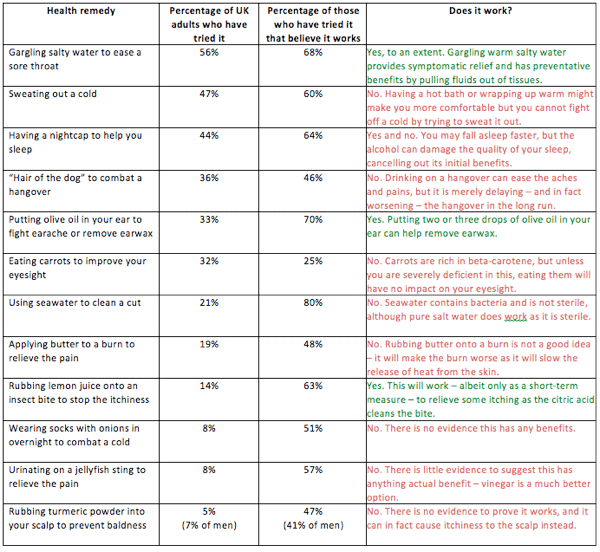Insights for Retailers - Archive
Insights, Research and Trends
Omega-3 shines in weight loss study

Inflammation and abdominal obesity may be improved with a reduced-calorie diet while implementing omega-3 supplementation, according to a study published in Healthcare.
The two-month clinical trial with 40 males aged 25-40 plus follow-up featured the same diet for two groups but with either marine omega-3 at 1.8g/day or placebo.
Abdominal obesity in the omega-3 group reduced by 35% compared to 5.6% in the placebo group, with greater weight loss in the former with an improvement in HDL cholesterol.
Are consumers warming to refills?
Research from GoUnpackaged reveals that two-thirds of Brits (65%) believe all retailers should be offering reuse and refill systems and moving away from single-use plastics.
When reuse and refill systems are made convenient, over two-thirds (68%) of consumers are likely to incorporate them into their weekly shop, with enthusiasm rising to 77% among younger shoppers aged 18-34.
Indications are that sustainability is no longer a “nice-to-have” with half of consumers (50%) actively preferring to shop with brands who implement reuse and refill systems, and 45% saying they would choose retailers prioritising reuse over those that don’t.
If every household in the UK opted to reuse just one item per week, it would eliminate over 1.4 billion items of single-use packaging per year.
Despite consumer appetite, there are still barriers stopping shoppers from making these simple changes. Over half (54%) of consumers struggle to find reuse or refill options at their regular supermarkets, and 47% find these schemes confusing or difficult to navigate.
“Retailers have a limited window to act,” says Catherine Conway, Director at GoUnpackaged. “Stores that embrace reuse and refill systems now can establish themselves as leaders in sustainable retail, while those that wait risk falling behind in a market that’s increasingly intolerant of wasteful practices.”
“With sustainability expectations soaring, and loyalty hinging on environmental responsibility, retailers that lead the charge in sustainable practices will secure their place in a greener future.”
Live healthy, live longer – Euromonitor

Trends giant Euromonitor forecasts growth in the number of consumers making behavioural changes to live healthier lives for longer.
Projecting VMS products to reach almost $140 billion this year, beauty-conscious consumers are using supplements to slow ageing and improve hair, skin and nails.
Euromonitor points to plant-based, dissolvable vitamin strips as a trending new product delivering folic acid, zinc and more for healthy hair.
Beauty sleep versions contain chamomile, valerian and B6 to reduce stress and produce serotonin and sleep neurotransimitters.
Products tipped to do well for stress-related hair loss include reishi mushroom and green tea ingredients along with a range of B vitamins, iron, selenium vitamins C & D, copper and folic acid.
For skin care, collagen that is free from heavy metals and contaminants along with hyaluronic acid, vitamin C and zinc in capsule form will perform well.
Brain health and weight loss are key 2025 trends

A science innovation conference in Cork, Ireland, at the end of last year was told that cognitive function and obesity management were the trends to watch in 2025.
Scientists and industry professionals were discussing recent advances in probiotic research.
After working through developments in probiotic labelling regulation and the potential for functional beverages, the conference focussed on the role of probiotics in brain health and metabolic health along with advances in cell analytics technology.
Aidan Fitzsimons, CEO of AnaBio, reported that multiple studies show that probiotics influence brain signalling in ways that may impact mood and concentration offering significant potential.
“With mental health becoming such a major issue in society, a natural solution like probiotics could make an enormous public health contribution if its potential is realised,” he said, adding that it was crucial to communicate this clearly to consumers to show proven efficacy.
Another significant issue was the obesity crisis which desperately needs solutions. With injectable treatments facing cost and supply challenges, supplements could provide the middle ground between food and pharmaceuticals in weight loss.
Hybrid shopping
A recent report from Modern Retail
(modernretail.co.uk) emphasises that it’s no longer a case of choosing between online or in-store experiences. Instead, it’s about creating a unified shopping journey that flows seamlessly between the two to cater to today’s diverse customer base of today, whether tech-savvy Gen Z-ers or Baby Boomers.
Consumers want convenience, flexibility and personalisation. This can be done by integrating digital tools with in-store experiences to provide frictionless, personalised shopping journeys no matter where the shopper is with their smartphone. An example is staking a claim to part of the £30bn of click and collect orders expected this year alone.
“Whether a consumer is browsing online or shopping in-store, the experience will be tailored, interactive and intuitive, giving customers exactly what they want, when they want it,” concludes Modern Retail.
‘Lead with love’ theme for Stress Awareness Month

April is Stress Awareness Month with an appropriate #LeadWithLove call in a troubled world so often fraught with the opposite of kindness, compassion and acceptance.
The annual event observed every April since 1992 is dedicated to increasing public awareness about the causes and cures of stress.
The Stress Management Society, a non-profit organisation established in 2003, has been at the forefront of this initiative for over two decades. Its mission is to help individuals and organisations recognise and reduce stress, fostering a happier, healthier, and more resilient world.
Last year, HR software provider Ciphr commissioned a survey of 2,000 nationally representative UK adults to discover how frequently people feel stressed in a typical month.
According to the results, 86% of people in the UK feel stressed at least one day a month. In July 2021, when Ciphr ran an identical survey, it was 79%.
• On average, a typical UK adult feels stressed around 10.3 days a month – over twice a week.
• Over half (60%) of UK adults report feeling stressed five or more days each month.
• Over a third of UK adults (37%) feel stressed 11 or more days a month.
• One in nine people (11%) in the UK say they feel stressed every single day.
• The number of UK adults who say they are stressed every day has increased by 57% since a similar 2021 survey commissioned by Ciphr.
• Women are more likely to say they feel stressed every day (14%, compared to 9% of men).
• One in seven (14%) UK adults say they never feel stressed – down from the 21% reported in the 2021 survey.
According to a Dr Vegan survey, poor sleep and insomnia are the most common symptoms of stress, affecting three-quarters of people, while poor sleep is also the most common symptom whether people find their stress manageable or overwhelming.
Stress itself, and when coupled with poor sleep, can exacerbate other symptoms of anxiety including irritability, difficulty concentrating, feeling weak and tired, worsening gut health and depression. A separate Dr Vegan survey of more than 700 people into gut health shows 66% of people’s gut health worsens when anxious.
www.stress.org.uk/stress-awareness-month-2025

Echinacea study opens the door for reduced antibiotic treatment
A 2024 study published in Antibiotics provides compelling evidence that taking a supplement of Echinacea purpurea could drastically reduce the need for antibiotics for bacterial complications arising from respiratory tract infections (RTIs).
People using Echinacea were 40% less likely to require antibiotics for their infections, and the total number of days people needed to take antibiotics was reduced by 70%, showing a significant decrease in dependency on these drugs.
The meta-analysis ‘Echinacea Reduces Antibiotics by Preventing Respiratory Infections’ (pubmed.ncbi.nlm.nih.gov/38667040) also found that Echinacea:
- Can reduce the likelihood of contracting an RTI by 32%
- Reduces by 40% the risk of experiencing recurrent infections
- Reduces respiratory infection complications by 56%
While antibiotics are ineffective against RTIs – colds and flu are viral in origin – complications arising from these infections are often bacterial in origin and therefore suitable for antibiotic treatment. The study found that fewer people experienced severe issues related to their infections when using Echinacea.
The study specifically highlighted that alcohol extracts from freshly harvested Echinacea purpurea are the strongest against viral infections such as colds and flu, significantly reducing treatment days on antibiotics by 80%.
Antibiotics are still prescribed to treat RTIs, often as a precautionary measure to reduce the risk of secondary bacterial infections, but the widespread use of antibiotics is becoming increasingly problematic.
Antibiotics often disrupt the delicate balance of the gut microbiome and can lead to a range of health problems including gastrointestinal issues and weakened immune function which can last for decades.
Widespread antibiotic use is also fostering the alarming rise of antibiotic-resistant bacteria. When bacteria are exposed to antibiotics, they can adapt and evolve, becoming resistant to the drugs designed to kill them.
Antibiotic resistance is a growing public health threat, as it limits the effectiveness of treatment options for bacterial infections and this poses a significant challenge to global health.
The study analysed 30 clinical trials involving 5,652 participants and concluded that Echinacea – specifically alcohol extracts from freshly harvested Echinacea purpurea – can provide a viable and safe solution to this pressing issue. Not only does it lessen the incidence and duration of RTIs, it also significantly reduces the need for antibiotics in the treatment of respiratory tract infections when they do occur.
The findings were unveiled in an A.Vogel research webinar featuring leading scientists.

Power-packed blackcurrants combat osteoporosis
Blackcurrant supplements could offer a promising natural approach to helping to ease osteoporosis issues in menopausal women, a study indicates.
Osteoporosis particularly affects women in the menopause transition due to falling oestrogen levels, with one in two British women over 50 impacted by the disease.
But results from a New Zealand blackcurrant extract clinical trial suggest the superfruit could help protect against this life-limiting condition, which is responsible for as many deaths from fracture-related causes as from Type 2 Diabetes and lung cancer.
Regarded a ‘national health emergency’ by the Royal Osteoporosis Society, there is currently a limited model of medical care for the disease, so effective interventions for women are urgently needed.
Researchers from the University of Connecticut found that high daily doses of the blackcurrant extract promoted beneficial gut bacteria that help maintain bone density, reduced inflammation and controlled specific molecules that promote bone breakdown.
The clinical trial, published in the Journal of Nutritional Biochemistry, tested low (392mg) or high (784mg) doses of blackcurrant extract a day, compared with placebo, on 40 peri- and early post-menopausal participants aged 45 to 60.
Those taking the high dose showed significant improvements in bone mineral density after just six months. The women exhibited a reduction in harmful proteins associated with bone resorption, a key factor in the development of osteoporosis.
The study demonstrated blackcurrant’s significant influence on beneficial gut flora balance and immune response, both of which play vital roles in bone health.
GP Dr Nisa Aslam noted: “It’s worth highlighting that it would be challenging to consume the necessary amount of blackcurrants naturally to match the levels used in the study. The high-dose group, which showed significant improvements in bone density, consumed the equivalent of about 284 fresh blackcurrants per day, or two capsules with 392 mg of blackcurrant extract.”
Source: CurraNZ
Elixir of youth
Chinese scientists have taken further steps in the importance of omega-3s in anti-ageing.
Research published in Frontiers in Nutrition indicated there may be an optimal dose of omega-3 to delay biological ageing measured by ‘phenotypical age acceleration’, or the difference between biological age and chronological age.
Now data from a study in mice shows that omega 3s, especially EPA, may activate receptors that play an important role in body functions including energy and lipid metabolism, inflammation, brain function and diabetes.
Scientists from three Chinese universities confirmed the anti-ageing effects of omega-3 PUFAs in multiple organs and reported their results in Pharmacological Research.
Harry Rice, VP of regulatory and scientific affairs at the Global Organisation for EPA and DHA Omega-3s (GOED), commented that further research could provide “one more reason to take a daily EPA/DHA supplement”.
NutraIngredients.com

Doshas in focus as UK looks to Ayurveda
Ayurveda, the ancient Indian practice of holistic health, is experiencing a significant surge in the UK where demand for Ayurvedic products, treatments and consultations has grown by 25% over the past year.
This increased interest aligns with a global trend that has positioned Ayurveda as a key player in the natural health and wellness market, projected to reach £12 billion globally by 2027.
The UK’s growing appetite for Ayurvedic solutions reflects a shift towards natural, preventive healthcare.
Amrita Ma Devi, a leading Ayurveda expert, explains, “Ayurveda appeals to those seeking a personalised path to health, addressing not just symptoms but the root causes of imbalance. People want holistic solutions that complement both physical and mental well-being.”
At the heart of Ayurveda lies the concept of doshas, or mind-body types – Vata (air and space), Pitta (fire and water), and Kapha (earth and water). Understanding one’s dosha offers a foundation for achieving balance in areas like digestion, stress resilience, and energy management, tailored to an individual’s specific constitution.
The UK market is increasingly meeting this demand, with wellness centres offering Ayurvedic treatments and workshops, and brands like Rituals and Pukka Herbs making Ayurvedic products widely accessible.

Consumers are waking up to gut immunity
A consumer survey by Optibac Probiotics revealed spending habits and attitudes on immunity this winter.
A poll of 2,000 adults indicated not only that a ‘tripledemic’ warning by doctors was hitting home, but that consumers planned to spend more this year on avoiding bugs.
More than a quarter said avoiding coughs, colds and flu was their top health concern and 15% said they’d dig deeper into their pockets.
Optibac has focused on creating awareness of the links between gut health and the immune system. Nutritional Therapist Louise Mason explained: “Up to 70% of our immune system resides in the gut, so improving digestive health is one of the best ways to support immunity.
“Our study found that 69% of people said they were already aware of a link between gut health and immunity, but only 8% of people had considered taking friendly bacteria to help them prime their gut-immune function against seasonal bugs.”
More than a quarter of those who want to improve their immunity said they had simply had enough of catching coughs and colds.
Other main reasons behind the public’s push for better immunity were so they can live life to the fullest (60%) and be in good health for their families (44%).
Louise added: “A positive we’ve seen from the study is that 26% of people are taking Vitamin D supplements to fend off colds, versus just 8% taking friendly bacteria. What a lot of people don’t realise though is you can get both in one supplement.”
Why gut health is a key focus for menopause
A consumer survey among women going through menopause has revealed just how effective making changes to diet can be for improving gut health and for symptoms of menopause.
Conducted among 1,526 women by Dr Vegan, the survey revealed that 91% of women going through menopause experienced changing gut health during the menopause, and that 66% of women who made changes to their diet found them effective in supporting them through menopause.
In addition, the consumer survey highlighted that women were twice as likely to notice changes in their gut health during perimenopause as they were at menopause.
Oestrogen plays a significant role in the health and composition of the gut microbiome, while the health of the gut microbiome itself affects the regulation of hormones, including oestrogen. As a result, there is a circular relationship between gut health and menopause symptoms, with changes to hormones contributing to worsening gut health symptoms, and vice versa.
Dr Vegan’s survey highlights the most common changes in gut health during menopause and how many women experience them: bloating 63%, excessive wind and gas 48%, constipation 43%, acid reflus 38%, IBS 35%, diarrhoea 26%, stomach cramps 24% and changes to colour/smell of urine or stools 22%.
It also highlighted four changes in diet that were shown to be most effective: increasing plant-based, reducing/avoiding alcohol, reducing/avoiding dairy or gluten, and increasing fibre intake.
Nutritionists and dietitians have long advocated for women increasing their plants, vegetables and fibre intake through menopause, and the consumer survey highlights just how effective making these changes can be.

The power of Q10
Coenzyme Q10 (CoQ10) is a powerful antioxidant made naturally by the body but levels are known to decline as we age. Low levels of CoQ10 are linked to chronic illnesses from dementia to cardiovascular disease.
Deficiency in adults is linked with higher levels of chronic fatigue syndrome, cancer risk, diabetes, cardiovascular risk and dementia risk, says Chris Woollams of canceractive.com.
For example, in 2014 Yamagishi et al demonstrated that a lower serum CoQ10 level was associated with a greater risk of dementia in Japanese people, he states (pubmed.ncbi.nlm.nih.gov/25463064).
"Low blood levels of CoQ10 have been found in people with metabolic diseases such as dementia, cardiovascular issues, chronic fatigue syndrome and diabetes," writes Woollams. "And in people with many cancers."
Heart failure is largely an energy-deprived condition so it's not surprising the Q-SYMBIO trial found that CoQ10 supplementation in patients with heart failure not only improved functional capacity, but also significantly reduced cardiovascular events and mortality.
It's also been found that topical application using CoQ10 can even benefit ageing skin while supplementation is thought to increase longevity.
It is recommended as a food supplement in conditions such as chronic fatigue syndrome, congestive heart failure (supported by randomised clinical trials), hypertension, angina, diabetes mellitus, muscular dystrophy and anti-ageing.

Ashwagandha highlighted in latest Alzheimer's review
An August 2024 review of medications for Alzheimer's Disease (AD) puts herbal remedies in focus compared with drug treatments.
"The intricate nature of AD, which involves multiple pathological mechanisms, indicates that drugs targeting a single pathway might be inadequate," say the authors Cyril Sajan et al in the review published in the Journal of Natural Remedies. "Herbal remedies, renowned for their diverse and multifunctional properties, present a promising alternative."
Ashwagandha (Withania somnifera) is classified as a "Rasayana", indicating its rejuvenating qualities, and is recognised for its antioxidant, free radical-fighting and immune-enhancing abilities.
For those who understand the terminology, Ashwagandha root contains various compounds like alkaloids, withanolides, sitoindosides and flavonoids. The review authors say it "slows down progression by inhibiting the activation of nuclear factor B, decreasing the production of Aβ peptides, preventing cell death or apoptosis, restoring normal functioning of synapses and boosting antioxidants by enhancing Nrf2 movement to the nucleus for increased antioxidant enzyme expression at the molecular level".
Ashwagandha root extracts support nerve cell growth, protect against damage from Aβ in neurons, and offer neuroprotection in neurodegenerative diseases. They reduce inflammation, prevent cell death, and decrease anxiety.
Ashwagandha can enter the brain and potentially reduce brain inflammation, showing promise for AD. Its alkaloid content calms the central nervous system, enhances memory and has the potential for reducing Alzheimer's-related deficits in animal models. Its varied benefits, especially its neuroprotection and memory enhancement, make it a promising herbal remedy for Alzheimer's.
An extensive list of other herbal remedies in the review includes turmeric, ginkgo biloba, liquorice, nutmeg, brahmi and ginseng.
doi.org/10.18311/jnr/2024/43485

Consumers lack understanding of dietary fibre
Very few consumers can identify what dietary fibre is, according to a survey of more than 1000 British adults aged 18 to 75.
A subsequent report entitled ‘Going against the grain' lays out the worrying health consequences of the great British fibre gap while providing simple tips to boost roughage in the diet.
"Brits need to plug the fibre gap if they want to live long and healthy lives," says Dr Gill Jenkins, a GP with a special interest in diabetes.
While two thirds (65%) of survey respondents thought that the nation was generally eating too little fibre, 45% thought they were falling short while almost four in 10 (38%) thought they were eating the right amount of fibre.
But national intake data shows that fewer than one in 10 (9%) reaches the recommended daily target of 30 grams.
Three-quarters (74%) of those surveyed claimed to know what dietary fibre is, but only a third (36%) were able to pick out the correct definition from a list, namely ‘a type of carbohydrate that humans can't digest'.
Dr Carrie Ruxton, a dietitian and advisor to the General Mills fibre campaign, which produced the report, says, "This means that nearly two thirds of Brits have no idea what fibre is."
She adds, "This hazy knowledge surrounding dietary fibre intake poses a real public health problem when you consider that poor diets are responsible for 11m deaths worldwide and more than 600,000 of these directly relate to low-fibre diets.
Fibre helps to manage blood sugar and blood cholesterol levels. It feeds good bacteria in the gut, it encourages pathogens and other toxins to move through the digestive system and out of the body, and it prevents overeating by helping us feel fuller after meals.
Particular areas of concern around lack of fibre include an increased risk of type 2 diabetes, cardiovascular disease and bowel cancer. The survey indicated considerable ignorance of these risks.

What's in store for our high streets?
Federation of Small Businesses (FSB) research paints a bleak picture for the future of UK high streets, but does this apply to the independent health store sector?
FSB research found:
- Plummeting consumer spending (70%), falling footfall (47%) and crime or anti-social behaviour (47%) are the biggest risks to high streets according to the small firms based on them.
- Over half of local businesses (57%) say a diverse range of independent businesses is one of the most important features for the long-term sustainability and future of their local high street.
- Good transport links are also key for the future of the high street, according to almost half (43%) of small businesses based on them.
- Around half (49%) of high street small businesses say parking facilities are managed poorly on their local high street.
- Since the beginning of the Covid-19 pandemic, most local businesses saw a range of closures on their local high street, including retail stores (72%), hospitality (69%), banks (58%), post offices (28%), and entertainment venues (20%).
We spoke to five independent health store owners across England to garner their views on current and future trading conditions. See what they told us here.

Healthy bounce
A report on the state of European grocery retail by global management consultancy McKinsey indicates that shoppers are increasing their spend on healthy, organic and sustainable options.
The report confirms that a focus on healthy eating is now a resilient trend and that the percentage of people prepared to pay more for healthier products has grown by 5% so far this year.
While organic was the sustainability category hit hardest in 2022 and 2023, it is experiencing a bounce-back in 2024 with consumers in all of the countries surveyed stating their intention was to buy more this year.

Failing the kids
Poor diet, food insecurity and poverty mean that UK children are shorter, fatter and sicker, according to an alarming report by the Food Foundation released in the summer.
It says the average height of five-year-olds is falling, obesity levels have increased by almost a third and the number of young people diagnosed with type 2 diabetes has risen by more than a fifth.
Aggressive marketing of cheap ultra-processed food, diets lacking essential nutrients and high levels of poverty are to blame.
The report concluded that failure to reverse this trajectory will result in a generation burdened throughout their lives by diet-related illnesses and the mental health impact of living with disease, followed by an early death.

Ayurvedic herbs and EFA supplements set for growth
The global Ayurvedic herbs market size is poised to register 10.1% growth between now and 2032, presenting significant growth prospects for companies operating in the industry.
Analysts VPA Research (marketresearch.com) made this prediction for Withania Somnifera (Ashwagandha), Frankincense (Boswellia), Indian Gooseberry (Triphala), Bacopa Monnieri (Brahmi), Turmeric, Cumin and Bitter Melon among others.
They took into account their use by form (raw, capsules/tablets, extracts), by indication (cardiovascular diseases, inflammatory diseases, diabetes, infectious diseases, auto-immune diseases, skin diseases etc.) and by distribution channel (B2B and B2C) to make their prediction.
They point to increasing consumer interest in natural and holistic approaches to health and wellness, as well as rising demand for Ayurvedic herbs and traditional medicinal plants known for their therapeutic properties.
Market growth is driven by factors such as growing awareness of traditional medicine as well as rising prevalence of chronic diseases and the shift towards preventive healthcare.
The expanding applications of Ayurvedic herbs in dietary supplements, herbal medicines and personal care products, as well as the growing adoption of organic and sustainable farming practices, contribute to market expansion.
"Further, the emphasis on product quality, safety, and regulatory compliance, along with the integration of Ayurvedic principles into mainstream healthcare, is expected to further accelerate market growth in the coming years," says VPA.
Essential Fatty Acids
VPA also sees a rosy future for the global Fatty Acid Supplements market which is poised to register 6.83% growth (CAGR) over the next six years.
Marine, algae and flaxseed oils as dietary supplements, functional food and beverages, infant formulas and pharmaceutical products were analysed.
For fatty acid supplements, key trends revolve around consumer awareness, product innovation and the growing recognition of the health benefits of omega-3s.
"With increasing concerns about cardiovascular health, cognitive function and overall wellbeing, there is a rising demand for high-quality, bioavailable fatty acid supplements derived from sources such as fish oil, algae oil and flaxseed oil," VPA concludes.
"Moreover, the integration of advanced formulation techniques, including microencapsulation and nano-emulsification, is enhancing bioavailability and efficacy [and] catering to diverse consumer preferences and nutritional needs."
Running on blackcurrants
Doing the little things right at the right time is what gives athletes the edge. Adding just 3% extra speed over a distance separates the winners from the losers.
A study purports to show that blackcurrant extract from New Zealand is one such little thing.
On average, runners participating in the double-blind randomised cross-over design study ran 3% faster with 900mg (three capsules) of CurraNZ berry extract, an exciting development for recreational athletes looking to blitz their next parkrun.
The University of Chester study researched trained male runners and triathletes, testing the effect of three capsules taken two hours before the 5km treadmill test.
Findings showed faster completion times in 88% of respondents and average improvements of 3% (38 seconds), compared to placebo.

Study shows ubiquinol helps in menopause
CoQ10’s role in cognitive health, heart health and anti-ageing is well documented.
The nutrient is also recommended for those on statins which are known to deplete CoQ10 levels.
And in 2008, a study in BioFactors reported that HRT also depletes CoQ10 serum concentrations, indicating a role in menopausal health.
New data by French research institute Expansion Consulteam in collaboration with two lifestyle influencers shows how the ubiquinol form of CoQ10 could alleviate menopausal symptoms.
Two hundred women aged between 45 and 55 with poor skin, sleep disturbance and anxiety were recruited to take 200mg a day of Kaneka Ubiquinol for two months.
Of these, 80% reported an improvement in mood and emotional stability and 70% reported better sleep quality, less muscular pain and improved wellbeing.
Source: NutraIngredients.com

AI to put kelp on the health menu?
Kelp seaweed is one of the next big sustainable ingredients to watch out for in Europe, according to the latest Mintel research.
Data from Mintel’s new Ingredientscape AI tool reveals that kelp's prevalence in new food and drink product launches across Europe steadily increased between 2005 and 2023.
The analyst is confident that there will be a growing number of food and drink launches in Europe that include kelp in the coming year.
Mintel launched Ingredientscape AI as a predictive tool to help food and drink manufacturers instantly understand the ingredients landscape to reveal emerging and winning ingredients within a category and country of interest.
Emma Schofield, Associate Director for Global Food Science at Mintel, says: "Interest in algae such as kelp seaweed is growing in Europe due to its health and sustainability benefits.
"Seaweed has already gained popularity in western cuisine as chefs and food manufacturers explore its unique flavours and nutritional value. Food and drink brands have the potential to explore greater options with kelp, for example in the snack category, creating seaweed-infused crispy seaweed chips or mixing seaweed into already popular items such as crackers or popcorn.
"Manufacturers can make seaweed more approachable for consumers and enhance its adoption by presenting it in familiar formats. Incorporating environmentally friendly seaweed into food and drink products can also enhance the nutrition profile of foods, such as by increasing its fibre content.”
While the majority of seaweed is currently farmed in Asia, Mintel thinks that producers should consider European-grown algae ingredients, tapping into consumer interest in the economic, environmental and social benefits of locally grown food.

Cannabinoids and Long Covid
Compounds in cannabis have the potential to prevent and treat Covid-19, according to a review conducted by researchers at Dalhousie University in Canada.
They found that cannabinoids could reduce the severity of SARS-CoV-2 infection, and claimed they could potentially prevent it.
The researchers propose that cannabinoids may act as a preventive approach by limiting susceptibility to the virus, mitigating oxidative stress and alleviating cytokine storms.
The study also suggests that cannabinoids, specifically CBD oils, could be used to treat symptoms associated with long Covid, including depression, anxiety, insomnia, pain and decreased appetite.
It's thought that around 1.9 million people (2.9% of the population) are experiencing self-reported long Covid. Of these, 69% had been experiencing symptoms for at least a year, and 41% had been experiencing symptoms for at least two years.
pubmed.ncbi.nlm.nih.gov/38202234

Are processed 'meat' alternatives as dangerous as animal products?
An international study has indicated that plant-based 'meats' are not associated with an increased risk of cancer, heart disease and type 2 diabetes.
In a study involving 266,666 participants over three decades, researchers found no link between ultra-processed vegan foods and these diseases. In contrast, regular consumption of ultra-processed meat and sugary drinks did have a significant association with all three.
The study investigated the link between multimorbidity – the co-occurrence of two or more long-term conditions such as cancer and heart disease, and various ultra-processed foods. The researchers found that ultra-processed plant-based alternatives "were not associated with risk of multimorbidity."
Participants were from seven European countries, including Denmark, Sweden and the UK. Researchers enrolled participants between 1992 and 2000. They then contacted them every three to four years to obtain information on any major diseases.
Published in The Lancet, it's thought to be the first study to test the disease implications of ultra-processed foods (UPF) in relation to multimorbidity across countries with long-term follow-up.
UPFs are foods that have undergone industrial processing to add substances like emulsifiers or colourings. Common examples include industrialised bread, pre-packaged meals, breakfast cereals and meats such as sausages and ham.
Previous research has sometimes considered UPFs as a single group – and a synonym for unhealthy – but the new research has added more nuance to this label.
High-dose omega-3s and CVD
Do omega-3 supplements at 4g a day pose an increased risk for those with atrial fibrillation in people with suspected heart disease?
The European Medicines Agency (EMA) thinks they do following several clinical trials saying possible adverse health effects can easily be overlooked.
They say food supplements containing omega-3s, especially over a long period of time, should only be taken by these patients after consultation with a doctor.
This has led to a number of letters on the matter being sent to professional agencies across Europe around regular fish consumption combined with supplementation.
While accepting the findings, the omega-3 industry is quick to point out that the findings involved high intake and only in relation to people at high risk of CVD, conditions that do not apply to the vast majority of people taking omega-3 supplements. It is not thought that the EMA opinion will have any effect on product labelling.
Is malnutrition rife in UK?
Staggering NHS figures have revealed that nutrition-related hospital admissions in England have surged 39% in the past decade. Among the key deficiencies are B vitamins and iron.
Reported in the Guardian, the Food Foundation says 15% of UK households – equivalent to approximately 8m adults and 3m children – experienced food insecurity in January, as high food prices continued to hit the pockets of low-income families.
Nearly two-thirds of food-insecure households reported buying less fruit and 44% bought fewer vegetables as they struggled with the ongoing cost of living crisis. In contrast, just 11% of food-secure households bought less fruit and 6% purchased fewer vegetables.
A further report by the Health and Food Supplements Information Service (hsis.org) reveals that many Brits badly need a nutrition reset with food portions out of control, comfort eating rife and immunity nutrients such as vitamin D and iron in decline.
Home test may help reduce mental illness risk
The charity Food for the Brain has launched a home test that can measure 'homocysteine', an indicator of a person's B vitamin status. Understanding this can help reduce the risk of mental illness.
Some people have a greater risk of depression, dementia and schizophrenia than others while there is also a big increase in problems among children.
"Homocysteine is a biomarker for over 100 diseases, but especially those of the central nervous system," says pharmacology professor David Smith FMedSci, formerly Deputy Head of the Faculty of Medical Sciences at the University of Oxford.
"It's a biomarker of impaired cognitive abilities in children, and in adults is a risk marker for stroke and for dementia and Alzheimer's, but also possibly for depression, anxiety, bipolar, schizophrenia, obsessive compulsive disorder, Parkinson's and multiple sclerosis. It is very much the forgotten factor, despite the research evidence being strongly positive. And the good news is, it is so easily corrected."
Nutritionist Patrick Holford, who heads the Food for the Brain charity, says: "A raised homocysteine level means something is going wrong with a vital process that controls how we think, feel and perceive. It's called methylation and is totally dependent on B vitamins. Some people absorb B12 less well. Some just need more of the B vitamin than others and that biochemical individuality, especially if their diet is already deficient, can tip them into a mental or neurological illness."
The home pin prick blood test is available from www.foodforthebrain.org/tests. The charity encourages those having the test also to complete a free Cognitive Function Test to help research the impact of homocysteine on mental health.

Promising results with Brahmi for ADHD
Attention deficit hyperactivity disorder (ADHD) is a neurodevelopmental disorder that is characterised by symptoms like hyperactivity, impulsivity, and inattentiveness.
Clinical diagnoses of ADHD and the use of prescription medications for its treatment have increased in recent years. Current treatments may involve amphetamine-type substances, a path not favoured by many parents. Therefore, alternatives are required.
Few nutritional or pharmacological alternatives that reduce ADHD associated symptoms (hyperactivity and inattention) have been subjected to rigorous clinical trials.
Read the full story here...

Consumer understanding of immunity has evolved
The World Health Organisation might have declared that Covid-19 no longer constitutes a public health emergency, but consumer interest in immunity isn’t decreasing.
That’s the starting point of health, nutrition and beauty ingredients formulator dsm-firmenich’s latest Immunity Report.
But the report goes on to identify a move from short-term measures designed to boost defences to a greater emphasis on overall health and quality of life as a result of improved immunity.
Read the full story here...
Climate warning on meat packaging?
Adding graphic warnings about health and climate change to meat products in a similar way to messages on cigarette packets could reduce consumption, a study suggests.
Researchers at Durham University found that a range of warning labels linking the consumption of meat to poor health, climate change and pandemics made people less likely to choose a meal that included meat.
They said between seven and 10% of people were swayed by cigarette-style messages and believe this could help people to eat healthier food and reduce their carbon footprint.

Menopause missing links
Almost half of women are worried their diets aren’t meeting their nutritional needs in menopause.
That’s according to a research report by the Health & Food Supplements Information Service (HSIS, www.hsis.org).
Menopause Nutrition: Challenges and Opportunities also found that too few women are taking the simple step of bridging nutritional gaps with a dietary supplement.
HSIS dietitian Dr Carrie Ruxton says: “Around the menopause, women’s nutrient intakes need to adapt to support their changing health status. It’s more important than ever to have plenty of bone-strengthening vitamin D and calcium as well as heart-healthy omega-3 fats and B-vitamins, which also support cognition and mood. But too many are simply unaware.”
Read the full story here...

Photo: Passion for the Planet
The D factor
Everyone knows that vitamin D is vital for healthy bones and a stronger immune system but could low levels be a major driver of Alzheimer’s and age-related cognitive decline?
Research suggests that the levels of vitamin D commonly found in the UK are accelerating cognitive decline and increasing the risk of a dementia diagnosis and that supplementing with vitamin D, especially in the winter, can reduce future dementia risk.
Vitamin D deficiency is well known to increase future risk of Alzheimer’s disease. A further large-scale study earlier this year involving over twelve thousand dementia-free 70+ year-olds shows that supplementing with vitamin D had a 40% lower incidence of dementia.
Read the full story here...

Vitamin D noses ahead of multivits in sales league
Vitamin D is the most popular supplement, according to research among 1,000 shoppers carried out by Lumina Intelligence for The Grocer with support from mainstream brand Centrum. More than 40% put it at the top of the list.
A multivitamin is second at 33% followed by vitamin C (31%) and omega-3/fish oil (25%).
However, the research notes that general multivitamin sales are in decline as shoppers opt for VMS tailored for specific health needs and life stages. This includes probiotics (11%) and age or gender-specific multivitamins (15%).
Read the full story here...
Study looks at vitamin body-balance
Research from the University of Aberdeen has found evidence that the brain controls vitamin balance in the body.
Previously thought to be the duty of other organs in the body including the liver and kidneys, this is the first-time that scientists have identified a role for the brain in vitamin regulation which could have implications for diagnosis and treatment of vitamin-related diseases from anaemia to infertility to blindness.
In this study, the scientists looked at vitamin A and how the brain reacts to it. Vitamin A is essential for life but until now it was not known how it is maintained in the body.
Read the full story here...

Chronic pain among young people
Chronic pain is defined as pain that lasts more than 12 weeks despite treatment or medication, most commonly as arthritis or musculoskeletal conditions, and typically treated with opioids or antidepressants. Currently more than 15m people in the UK are affected.
Worryingly, this is said to be caused disproportionately among younger patients as a result of stress, sedentary lifestyles, obesity and work stress. Research shows that an alarming 91% of 18-24-year-olds feel stress at work.
Medical cannabis clinic Mamedica adds that this might be having direct effects on physical health as they found 18% of Gen Zs say they have hlsustained an injury at work leaving them with chronic pain.
Read the full story here...

'Now' generation seeks nutrition in beverages
Growth in demand for products aimed to help proactively manage health has been observed by the Kerry Health and Nutrition Institute.
This includes ‘specific need states’ such as energy and immunity and is especially true for beverages with health claims previously found only in supplements.
At the heart of this trend is innovation in functional ingredients designed to deliver those health benefits, but scientific research demonstrating a true health benefit, as well as research on safety for regulatory compliance, is critical.
Read the full story here...
Indies have taken a body blow but the prospects are good
Soil Association Certification’s 2022 Organic Market Report revealed that independent retailers faced a challenging year with sales dropping 3.3% to £432.1m.
This followed a buoyant period during the pandemic when some retailers, including health food stores, were classed as ‘essential businesses’.
But when pandemic restrictions eased, they faced the challenge of trying to retain these new customers during a period when shoppers were spending less and shopping less often. Over 60% of retailers saw inflation as the number one challenge but two thirds believed that sales would increase in 2023.
Read the full story here...

COQ10 and heart health
Scientific cardiology publications don’t usually write about nutritional supplements. This makes it even more noteworthy that the Journal of the American College of Cardiology (JACC) featured an article about the compound CoQ10.
News about nutritional supplements doesn’t usually feature in this journal so Pharma Nord was quick to point out that four of the published studies mentioned in the article were conducted with Pharma Nord’s CoQ10 formulation.
Two leading cardiologists in Texas, Dr. Albert E Raizner from Houston Methodist Sugar Land Hospital, and Dr. Miguel A. Quiñones from Houston Methodist Willowbrook Hospital, described multiple studies that have been conducted with CoQ10, which is normally concentrated in heart muscle tissue.
Read the full story here...

Biotin deficiency
Biotin plays a vital role in assisting enzymes to break down fats, carbohydrates and proteins in food. But a deficiency leads to dysbiosis of the gut and a reduction in mucus-resident microbes, in turn leading to characteristics of Inflammatory Bowel Disease.
That was the conclusion of research at the University of California into microbiome-favoured species that can synthesise biotin, a water-soluble B vitamin.
Read the full story here...

Feel their pain
Research from the University of Oxford has found that nearly one in 10 young people are experiencing both persistent physical pain and suicidal feelings.
The paper highlighted that fewer than half were in recent contact with their GP, and a quarter were not accessing any support services at all.
Researchers from Oxford University's Department of Psychiatry have observed that access to prescription medication for pain and mental health difficulties has stronger associations with increasing the risk of suicidality.
Read the full story here...

Where the UK sits in the European plant-based industry
We spoke to Jonathan Morley, Managing Director at Plant Based World Expo, about a recent report into the European Plant-Based Market and the opportunities it presents to the UK. The research by Vegg2food demonstrates the breadth of the plant-based food market across Europe.
“On the whole, the data shows the market is growing with Germany and the UK leading the way in terms of innovations, holding 15% and 14% of the market share respectively,” says Morley.
Driving this demand is an increase in flexitarians, vegetarians and vegans, sparked by three major factors: people seeking a healthier lifestyle, environmental concerns and animal welfare.
Read the full story here...
How shopping habits have changed
More than a quarter of Brits now make the majority of their purchases online – an increase of 18% when compared to shopping pre-pandemic, according to new data.
Global business messaging provider Esendex surveyed customers in the UK, United States, Australia, France, Germany, Italy and Spain to discover what the retail landscape looks like in 2022. More than a quarter of Brits (29%) now make more than 80% of their purchases online, compared to 11% pre-pandemic.
The survey of 4,000 international shoppers found those living in the UK were most likely to have changed their shopping habits over the past few years. Wider statistics from the survey show that those living in the UK, France and Italy are the least patient when it comes to customer service. More than half of the respondents from these territories admit they get frustrated if they have to wait more than five hours for a response, highlighting demand for an ‘always-on’ culture.
Chris Gorman, Head of Professional Services at Esendex, says: “At the heart of what we discovered is that there’s been a real shift in shopping habits, in the way people are making purchases, and wanting to get in contact with their favourite brands. The lesson here is for businesses to ensure they build an omnichannel presence so that customers can get in touch via the platform(s) they prefer.”
Ready to switch to healthier food
Kantar Worldpanel research revealed at the Healthy Futures Forum in London in October found clear messages from consumers that they were willing to shift to healthier products if the taste was good, the products were well-priced and easy to find in-store.
The research compared consumers who claimed they were ‘struggling’ financially to those who said they were ‘comfortable’. Almost two-thirds of the struggling group said they were ‘easily tempted’ to buy confectionery and salty snacks when they were discounted, compared to only half of respondents saying the same thing in the comfortable section of shoppers.
Almost one-third of those self-classifying as ‘struggling’ were still ready to change their diets.

Leaping sales of sustainable fish oils
More UK consumers than ever before want to improve the environment and the health of the oceans when they decide which fish and krill oil supplements to buy, according to the Marine Stewardship Council (MSC).
Consumers in the UK and Ireland spent a record £7.87m in 2021 on MSC labelled fish oil and supplements, a 12% increase on the previous year, according to the MSC figures.
There are over 50 MSC labelled fish and krill oil supplement products for consumers in the UK and Ireland to choose from, nearly double the number that were available six years ago.
Read the full story here...
Daily multivitamin may slow cognitive decline
Could taking a daily multivitamin help maintain cognitive health as we age and possibly prevent cognitive decline?
Research by Wake Forest University School of Medicine in collaboration with Brigham and Women’s Hospital in Boston indicates that a daily supplement may improve cognition in older adults.
The findings were published in the Journal of the Alzheimer’s Association and reported in Science Daily.
Read the full story here...

Rooibos elevated to ‘superfood’?
Rooibos tea could be the next anti-ageing superfood, according to research published by French and Brazilian scientists writing in the journal Foods.
Their paper looked at helpful plant compounds in the traditional South African shrub used to make red bush tea.
Although a natural process, ageing can be faster in some people due to free radical damage of body cells, inefficient cell repair, degeneration of brain cells and glycation – where body proteins become saturated with sugars.
Read the full story here...

Further evidence for echinacea and coronavirus
Clinical study results unveiled by A.Vogel in October confirm the broad antiviral efficacy of Echinacea purpurea extract in both preventive and acute therapy.
The study was carried out by an international team of researchers during the pandemic to explore Echinacea’s preventive use against viral respiratory infections, including SARS-CoV-2.
120 adults either took Echinacea purpurea for five months or placebo. Nasopharyngeal and blood samples were routinely collected to measure the presence and concentration of respiratory viruses, including SARS-CoV-2.
Read the full story here...

Science discovers the power of manuka honey
Scientists have devised a treatment combining a powerful antibiotic with manuka honey to treat a lethal bacterial lung infection while at the same time reducing drug side-effects.
Aston University researchers combined the antibiotic amikacin with manuka honey as a novel treatment for Mycobacterium abscessus.
Manuka honey is known to have wide ranging medicinal properties, but more recently has been identified for its broad-spectrum antimicrobial activity. The scientists found that it has the potential to kill a number of drug-resistant bacterial infections such as Mycobacterium abscessus which usually affects patients with cystic fibrosis or bronchiectasis.
Read the full story here...

New normal shopping
Market researcher Kantar recently conducted a survey to look at the impact of inflation and today’s economy on consumer support for sustainable practices.
Many respondents’ shopping and lifestyle habits have changed in response to the rising cost of living. For instance, globally, 54% cook at home more, 41% buy more reusable products, and 39% say they make more use of natural products found near their home.
In terms of buying eco-friendly brands over the past year, 58% globally say they regularly did so for grocery products, 53% for cleaning and laundry, 52% for paper products, 27% for cosmetics and 11% for baby products.
Read the full story here...

The effect of rising prices
A mid-July report from the Office for National Statistics (ONS) says consumers have started shifting back towards shopping in store, although spending online remains high.
But in recent months, according to the ONS Opinions and Lifestyle Survey, people have cut back on food shopping as a result of the cost-of-living crisis.
Read the full story here...
High street footfall down
High street footfall fell 25% in May 2022 compared with April, according to RSM UK’s analysis of the latest data from Datscha.
The biggest month-on-month decreases were seen in Glasgow (down 54%), Newcastle (down 40%) and Brighton (down 39%).
Footfall is still 48% lower than pre-pandemic levels, driven by London (down 68%), Newcastle (down 67%) and Glasgow (down 67%). London continues to be hit by hybrid working with less workers commuting into the city, and international and business travel is still not back at full capacity.
Train strikes coupled with weak consumer confidence affected footfall in major cities.
However, Guildford and Leeds bucked the trend, increasing 8% and 2% month on month, and were the only two cities to exceed pre-pandemic levels in May.
Jacqui Baker, partner and head of retail at RSM UK, comments: “This was the first month that consumers really felt the magnitude of various prices increases, such as energy and fuel. Consumer confidence also reached an all-time low of -41%. As a result, consumers are having to tighten their purse strings which we’re witnessing on the high streets.”

What’s happening online?
Online sales were in freefall in May but recovered slightly in June. Compared with June 2021, growth dipped just -2.3%.
According to the IMRG Capgemini Online Retail Index, which tracks online sales for 200 retailers, the figure represents a slight levelling of sales as typical growth for this time of year is around +2-5%, putting this result at the low end of ‘normal’.
Elsewhere, after rising rapidly since January, the Average Basket Value (ABV) seems to have stabilised for the first time this year – dropping from April’s peak of £150 back to £145. This is still very high historically, suggesting that consumers continue to prioritise quality over quantity with their purchases.
Read the full story here...
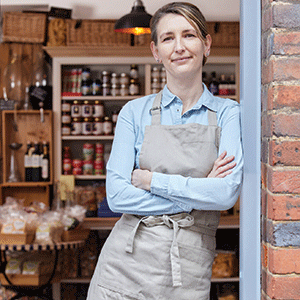
Consumers want local and trustworthy
According to the latest NielsenIQ study released mid-July, almost half of UK consumers (46%) say they’re buying a greater variety of brands than they were before Covid-19. Consumers are also largely in search of their perfect brand match, with 58% of UK respondents feeling that if they look hard enough, they can find a brand that fits their exact needs.
These findings appeared in the Brand Balancing Act, which focuses on how inflationary pressures are changing the way small and medium brands can justify their worth and remain aligned to the core values sought by consumers. The analysis also highlighted:
- 50% of UK consumers prefer to buy locally made products from small businesses in their area
- 48% try to support small brands where possible, but are finding it harder to find them on the shelf
- 51% feel that small brands are more authentic and trustworthy than big brands
- 58% think that small brands are usually more expensive, but consumers are prepared to pay a bit more – this is higher than the global average (47%)
Read the full story here...

Mood and wellbeing high on the consumer mind
Addressing emotional and mental wellbeing through mood management, stress relief and sleep aids has become a key trend in the food and nutrition space, according to Euromonitor.
Companies are exploring different ways to position their products in this space. For example, CBD-infused food and drinks, the use of adaptogens like ashwagandha and nootropics such as L-theanine are gaining momentum for their stress-reducing and mood-uplifting properties.
Another emerging trend gaining traction is functional food with a beauty positioning. More consumers are taking an interest in products that promise to deliver beauty from within, creating opportunities in edible beauty.
Read the full story here...

Study adds to list of long Covid symptoms
Long Covid sufferers have experienced a wider set of symptoms than previously thought including hair loss and sexual dysfunction, new research has found.
A study published in Nature Medicine found that patients with a primary care record of infection with the virus that causes Covid-19 (SARS-CoV-2 coronavirus) reported 62 symptoms much more frequently 12 weeks after initial infection. This is compared to patients who hadn’t contracted the virus.
The anonymised electronic health records of 2.4m people in the UK were analysed by researchers from the University of Birmingham alongside a team of clinicians and researchers across England.
Read the full story here...

How youngest and most digitally adept consumers are forcing change
The living, shopping, and financial habits of Gen Z or ‘Zoomers’ (consumers aged between 16 and 24) are very different from previous generations. This demographic, who never knew life without the internet and smartphones, currently represents the largest population group, surpassing Millennials in 2019.
To shed some light on Zoomers, the global payments platform Thunes conducted a world-wide study into their shopping, social and payment preferences. They interviewed 6,500 people between the ages of 16 and 24 from 13 developed and emerging countries around the world, including the UK.
Read the full story here...
Cost-of-living squeeze drives job hunters to retail
The retail sector is seeing a surge in people seeking extra sources of income as the cost-of-living crisis bites.
A survey has revealed the full impact that the crisis is having on peopleís lives already.
Research by staffing platform redwigwam showed that 77% are looking for extra work to make ends meet and 59% are looking for extra work on top of a full or part-time job.
Read the full story here...

How supply chain issues are affecting functional foods
A recent report from research consultancy marketsandmarkets.com on the functional foods ingredients market reflects on the impact of trade barriers to raw materials and disruption to imports.
“The non-availability and high cost of raw materials and high production costs are likely to create challenges for the growth of the global functional food ingredients market,” warns the report which focuses on the market for probiotics, prebiotics, proteins and amino acids, phytochemicals and plant extracts, omega-3 fatty acids and carotenoids.
With many vitamins sourced from China and Covid-19 disruption, there has been negative impact on transport channels, heightening the world to the sensitivity of the supply chain.
Read the full story here...
Obesity link to dementia
Japanese scientists believe they have discovered a link between sarcopenic obesity (obesity combined with poor muscle mass) and dementia. A team led by Dr Yoshifumi Tamura of Juntendo University, Japan, studied more than 1600 elderly people and concluded those with sarcopenic obesity had a higher prevalence of mild cognitive impairment and dementia.

Inflammation and flagging immune systems
The negative effects of chronic inflammation in our bodies explain why people who are overweight or have underlying health conditions have tended to fare worse with Covid-19 symptoms.
A recent report reveals the essential foods to keep inflammation in check and protect long-term immune health.
Entitled Inflammunity: How hidden inflammation is harming our immune response, the report was commissioned by the Fruit Juice Science Centre so it obviously suggests 100% fruit as part of the answer, but simply put it recommends following a Mediterranean diet.
Read the full story here...

The high cost of a crisis
The deepening cost-of-living crisis has resulted in many harsh facts. Such as this – one in seven adults (around seven million Brits) are ‘food-insecure’.
As we all know, families are under extreme mental health stress as they are forced to cut back on food and skip meals, a number that has risen by 57%, according to The Food Foundation.
In light of Mental Health Awareness Week in May, ‘smart food’ innovators yfood commissioned research that investigated how the cost-of-living crisis has impacted the way that Brits are spending their money and the long-term effect on their mental and physical wellbeing.
Read the full story here...

Consumers will accept higher prices for eco transparency – Mintel
In food and drink, consumer expectations have grown beyond stories and detailed claims. They now want to see trustworthiness and measurable progress on health, environmental and ethical commitments.
That’s a key conclusion in the current Mintel Food & Drink Trends Report (mintel.com).
Mintel predicts that consumers will expect more transparency about a brand’s climate-friendly and ethical commitments. Brands can add accountability with third party verification or measurements via rating systems.
Read the full story here...

Herbal teas to the rescue for a plethora of issues
A Tea Advisory Panel (TAP) research review – Herbal Infusions and Women’s Health – presents emerging evidence that herbal teas such as German Chamomile, Rosehip and Spearmint could help manage several key issues for women from poor quality sleep to memory loss and debilitating PMS.
Over the past two years the many lockdowns, repetitive routines and quarantines mean that our memory function has not had to work to take in new experiences, hence for many a state of brain fog. Moreover, medical experts say that contracting Covid-19 can have a negative impact on memory for up to nine months afterwards.
Read the full story here...

Study reveals the power of vitamin D3
Many of our readers will have seen the latest research that found significant differences between the two types of vitamin D, D2 and D3.
A collaborative study by Surrey and Brighton universities, published in Frontiers in Immunology, found that vitamin D3 could balance people’s immune systems and help strengthen defences against viral infections such as Covid-19.
The researchers discovered that both types of vitamin D did not have the same effect. They investigated the impact of D2 and D3 supplementation taken daily over a 12-week period on the activity of genes in blood.
Read the full story here...
Alarming decline in mental health among young generation
Sapien Labs, a non-profit research organisation focused on tracking changes in the mind and brain, has released its second annual Mental State of the World Report (MSW).
The MSW report is the world’s largest and most comprehensive global mental wellbeing study, drawing on insights from 223,000 respondents across 34 countries between January 1 and December 31, 2021.
It utilises the Mental Health Quotient (MHQ), an open online anonymous survey that takes 15 minutes to complete and returns overall wellbeing scores. Scores are on a positive-negative scale where positive scores represent a normal range of functioning while negative scores indicate a negative impact of mental health on the ability to function normally.
Read the full story here...

Just when we thought it was safe to open the wallet
Consumer card spending grew 13.7 per cent in February compared to the same period in 2020 – the highest growth since November 2021 – as the lifting of Plan B restrictions and work-from-home guidance encouraged Brits to socialise, shop and make travel plans as the economy re-opened.
However, with costs continuing to spiral with the latest global crisis impacting society following the Russian invasion of Ukraine, consumer confidence may be knocked back again.
Read the full story here...

Online growth falters
Despite February’s Year-on-Year online retail growth dropping even lower than the previous month’s record low, there were signs of a return to normal spending patterns within the broader set of results.
That’s according to the IMRG Capgemini Online Retail Index which tracks the online sales performance for over 200 retailers.
Read the full story here...
Retail gets ethics message
UK retailers have cancelled more than £7bn in contracts across the last 12 months with suppliers that don’t meet stringent ethical and sustainable standards, a report from Barclays Corporate Banking reveals.
The bank’s report shows that the pandemic and an increasing focus on Environment, Sustainability and Governance (ESG) are shifting business priorities.
In a study of more than 300 retail decision-makers, the majority (51%) say sustainability is more important now than it was two years ago and 49% say the same about ethical standards.
Additionally, almost four in five retailers think that a long-term strategy to improve their ethical and sustainable credentials is more important than overcoming short-term supply chain disruption.

Thoughtful millennials focus on child health
Parents are increasingly health-conscious and well informed, and want to support their children’s health with safe, credible and science-backed products.
Not surprisingly, more than half (53%) of survey respondents in households with children say that immune health is their top reason for purchasing healthy lifestyle products. That’s the finding of the 2021 Kerry Global Consumer Survey on Digestive, Immune and Joint Health.
The survey shows that 75% of Millennials, who are parents to 50% of the UK’s children, carry out extensive research ahead of a purchase. Foods, beverages and supplements with functional benefits also have to fit into their busy lives and appeal to their children’s tastes.
Free-from and functional foods surge in demand
The free-from market continues to enjoy a surge in popularity, with consumers increasingly embracing eco-friendly and free-from alternatives.
In 2020, free-from values sales increased by 16.9% to break the £1bn ceiling (Mintel Market Report). This growth continued throughout 2021, with early reports showing demand soaring by 19.6% (£496.1m).
Read the full story here...
Organic sector breaks £3bn barrier
Soil Association Certification's Organic Market Report 2022, released February 9th, reveals the UK's organic market is now worth a record £3.05 billion after a 5.2% growth in sales in 2021, with shoppers spending almost £60 million on organic products every week.
The organic market has enjoyed ten years of positive growth despite the pandemic and the on-going challenges thrown up by Brexit.
The report shows strong performance across all food and drink sectors including supermarkets (+2.4%), independent retailers (+9%), food service (+3.3%), and with particularly strong performance for online and box schemes which together delivered growth of 13% worth £558m.
Find out more here.

A matter of trust
NielsenIQ findings presented at last year’s Soil Association Certification Trade Conference showed:
- 79% of people say they are increasingly worried about the natural world and our impact on it
- 81% of people are worried about excess packaging and waste materials
- 86% would like their food to be produced in a more natural way without excess processing and chemicals
Read the full story here...

Brits get the nutrition message but are slow to reset
Three-quarters of Brits recognise that immune health is compromised by bad diets, according to a report commissioned by the Health and Food Supplements Information Service (www.hsis.org), yet there are worrying signs that our diets are way off track, putting immune health under strain this winter.
The report – Immune Health: Micronutrients Under the Microscope – reveals that many Brits badly need a nutrition reset with food portions out of control, comfort eating rife and immunity nutrients such as vitamin D and iron in decline.
Key findings from the HSIS report show:
- More than a fifth of respondents (21%) have been advised by healthcare professionals to change their diet to lose weight.
- Intakes of vital immune-supporting nutrients, including vitamin A, vitamin D, B vitamins and iron, have declined over the last decade.
- Almost half (48%) say they have no idea what the Government’s Eatwell Guide advises.
- Around two-thirds (64%) of adults don’t take a vitamin D supplement.
Read the full story here...

Rise in CBD for pain, sleep and mood
Data commissioned by alphagreen.io reveals the number of Brits using CBD products rose 7% from 7.8m to 8.4m million in the year to Autumn 2021, and most are taking it to combat problems with pain, sleep, and mood.
Dr Attam Singh, Clinical Associate at the London Pain Clinic, says: “The research reveals that a significant number of adults are using CBD products to support their health in a wide range of ways. Patients are looking towards natural remedies to mitigate and soothe pain, sleep and mood symptoms, as well as other mental and physical health concerns.”
The most common reasons for buying CBD included:
- Relieving pain (39%)
- Resolving sleep problems (25%)
- Supporting cardiovascular health (21%)
- Enhancing the immune system (20%)
- Improving focus and mindfulness (18%)
- Managing stress and anxiety (14%)
Read the full story here...
Pandemic dip for deodorants and cosmetics
Lockdowns followed by home working and restricted socialising weighed heavily on sales of some personal care products, according to Nielsen IQ.
The consumer research specialist reported a sales decline for both deodorants (-£37.8m) and cosmetics (-£40.0m) in The Grocer’s Top Products survey 2021.
But with more time spent at home, shoppers treated themselves more regularly with sales of snacking items such as chocolate (+£147.7m) and bagged snacks (+£130.6m) rising significantly.
Read the full story here...

Shedding light on vitamin D
With recent research revealing over 13m people are at risk of developing serious illnesses from low vitamin D levels (Warburtons Vitamin D Report 2021), learning about the importance of vitamins has never been more essential.
Vitamin D is known to benefit the immune system to fight widespread infections usually present in the winter months.
Meanwhile, Opinium research last year revealed that only 33% of Brits take daily vitamins, while just 28% believe vitamin D is important in our diets.
Read the full story here...
Covid effect on plant-based food
Vegan meals now account for one in eight meals we prepare at home, according to Kantar’s panel data. This equates to an additional 350 million plates of food that are now vegan-friendly, compared to five years ago.
The consumer research company says 11% of adults in Britain (six million people) agree with the statement ‘I prefer vegan food and drink’ and this has remained relatively static over the past five years.
It is important to note that the rise in the consumption of plant-based meals is not driven solely by vegans.
Read the full story here...

Stress pushes skin to breaking point
A survey has revealed nearly seven in 10 UK adults are experiencing skin flare-ups due to stress.
Data commissioned by Typharm’s Skin Life Sciences Foundation has found that 66% of adults say that recent periods of stress and anxiety have caused skin flare-ups, dryness and itchiness. A quarter said their existing eczema or psoriasis gets worse when they’re stressed.
Nearly a third (27%) also reported allergic-type skin reactions which happened for no apparent reason. A quarter put this down to stress, while a fifth blamed it on anxiety.
Read the full story here...
Consumers won’t tolerate being an afterthought
Online customer service enabler Zendesk has annual research that highlights the potential for businesses to focus on customer experiences. More than two thirds of consumers worldwide (70%) report making purchase decisions based on the quality of customer service they receive.
The Zendesk Customer Experience Trends Report 2022 reveals that almost half of UK customers (48%) feel customer service is an afterthought for businesses, indicating a gap between consumer expectation and company actions.
“Companies cannot afford to have a purely transactional relationship with their customers,” says EMEA Chief Technology Officer Matthias Göhler. “This year’s report shows clear gaps between expectations and actual delivery of service. Customers are noticing this gap and they’re making purchase decisions based on the service they receive.”
Zendesk.co.uk

Euromonitor spotlights 2022 consumer trends
Retailers that can react swiftly to supply chain shortages will succeed in 2022. Consumers will prove themselves to be creative in finding alternatives if their favoured product isn’t available, according to market researcher Euromonitor International in its new Trends report for 2022. Other trends include:
- Climate Changers: Eco-anxiety and the climate emergency will drive environmental activism for a net-zero economy. In 2021, 35% of global consumers actively reduced their carbon emissions.
- Digital Seniors: Older consumers are becoming savvier tech users. Virtual solutions must be tailored to the needs of this expanded online audience.
Read the full story here...
Immunity shortfalls laid bare
Too little too late – that’s the conclusion on the vitamins message drawn from a review commissioned by the Health and Food Supplements Information Service (HSIS)* and published in Nutrition & Food Technology Journal.
Reviewing evidence from more than 70 studies, lead author Dr Pam Mason found that no fewer than 10 different nutrients are required for a normal, healthy immune system – vitamins A, C, D and E; B complex; iron and zinc; selenium; copper; and omega-3 fats. Probiotic and prebiotic supplements are also proven to support immunity.
National dietary surveys reveal that many people – especially teens, young adults, and the elderly – are not getting the right amounts of crucial immunity nutrients in their diets.
Read the full story here...

Some food trends for 2022
Back in October, retailer Whole Foods Market unveiled its top anticipated trends for 2022 as part of its annual Trends predictions.
Ingredients such as moringa, turmeric and yuzu are expected to gain popularity while movements such as ultra-urban farming and reducetarianism are expected to take off.
Each year, a Trends Council of more than 50 Whole Foods Market team members, including local foragers, buyers, and culinary experts compile trend predictions based on their experience in product sourcing and studying consumer preferences. Predictions for 2021 included upcycled foods, boozy kombucha and up-levelled pantry staples.
Read the full story here...

Irish health stores are top of the pops for supplements
The Irish market for supplements is looking good. Almost 60% take food supplements and most of them do so all year round. Of those, a third (66%) take them daily.
What's more, health food stores are the favoured place to buy them and when it comes to buying food, half say they prefer seasonal or locally produced.
Read the full story here...
Oat milk now the cream of vegan alternatives
A third of Brits use plant-based milk, up from a quarter in 2020, and half of UK adults think milk choices make a difference to the environment.
That's the trend noted by Mintel in its latest UK shopper habits research.
Read the full story here...

Fish oils stabilise Alzheimer’s memory function
It will come as no surprise to our industry that there has been further positive research into the use of omega-3s in Alzheimer's sufferers.
Nutritioninsight.com reports researchers in Sweden have found a positive correlation between omega-3 intake and memory in Alzheimer's patients who performed a cognitive test.
Read the full story here...
Spending up, especially in specialist stores
Consumer card spending rose by 15.4% in August compared to the same period in 2019, with growth recorded across all sectors apart from international travel.
Data from Barclaycard, which sees nearly half of the nation's credit and debit card transactions, reveals how the end of summer gave the economy a boost, while shedding light on the inflation concerns causing many to review their spending habits.
Read the full story here...
Tap happy - we're going contactless
Contactless spending is expected to account for almost half (47%) of all transactions by the end of 2022 as it becomes the most popular payment method for the first time.
Research by VoucherCodes.co.uk by the Centre of Retail Research (CRR) examined the pandemic's effect on the way UK shoppers pay for goods.
Read the full story here...

Berries hit the spot for blood pressure
Flavonoid-rich foods such as berries, red wine and apples and pears have caught the eye of clinicians in making reductions in systolic blood pressure.
Queen's University Belfast researchers noted an interaction with the gut microbiome which resulted in production of metabolites with enhanced bioactivity.
Read the full story here...
Onwards and upwards
Numbers of independent retailers have risen for the first time in four years, according to new figures from the Local Data Company (LDC). Its report says that barbers, bakers, convenience stores and takeaways are plugging the gap left by collapsed chains with 804 new indies opening in the first half of 2021.

Unforgiven - UK frowns on poor customer service
More than a third of people (38%) in the UK say their experience with customer service has worsened over the last year, making it the highest figure in the US and Europe.
The Customer Service Index 2021 produced by cloud contact software firm Five9 also found that nearly half of UK respondents (44%) are very unlikely to be willing to do business after poor customer experience - making it the least forgiving country.
Read the full story here...

Kitchen herb for menopausal symptoms
Recent research shows the ‘kitchen herb’ Sage leaf (Salvia officinalis L.) is an effective treatment for a wide range of menopausal symptoms.
Published in the open access science journal Heliyon, the double-blind, randomised, placebo-controlled clinical trial showed Sage leaf can provide an effective and natural alternative for women who are unable or unwilling to take conventional hormone replacement therapy (HRT).
Read the full story here...

Consumers will pay more online if delivery is free
More than half (55%) of consumers are willing to pay more for a product if delivery is free, according to a survey of over 2,000 British consumers by global payment service provider emerchantpay.
Consumers are happy to spend 4.63% more on average says the New World, One Market Report, which examines consumer behaviour post-pandemic.
Read the full story here...

It’s not nuts
A team of researchers from the Institute for Physical Activity and Nutrition (IPAN) at Deakin University, Australia, believes eating nuts has a positive effect on cognitive performance.
Researchers monitored nut intake and diet quality of the 1,814 participants aged 60+.
The Consortium to Establish a Registry for Alzheimer’s Disease (CERAD) test was used to evaluate the cognitive function of each participant. This included immediate and delayed recall, verbal fluency and processing speed and attention.
Read the full story here...

Healthy’s coming home
A whopping 62% of Britons have made a change to their diet to get healthier over the past year.
A survey conducted online by YouGov as part of the British Nutrition Foundation’s Healthy Eating Week in June, looked at the changes people have made to their diet and lifestyle over the year since May 2020.
Read the full story here...

More babies on the way
A nationwide study suggests that health stores should increase their stock of mother and baby products.
The First Direct survey of 2,000 couples in their 20s and 30s indicates that Gen Z and Millennials are fuelling a baby boom with almost half of young couples saying the ‘new normal’ means they will start a family sooner.
Read the full story here...
Plastic tax ‘should not punish compostables’
The British public wants to get rid of plastic packaging on their food and have compostable packaging instead, a poll has revealed.
The survey also found that most (83%) are supportive of a tax on plastic packaging to curb plastic waste. It found strong public support for compostable packaging as a sustainable alternative to traditional plastic packaging.
Read the full story here...

Shoppers engaging with #shoplocal
Covid-19 accelerated an already growing trend of consumer support to shop locally, says AI social media platform Maybe.
Between March 1 and June 30 there were more than 77,000 pieces of content across Facebook, Twitter and Instagram using the #shoplocal hashtag.
Read the full story here...

Keeping fish on the dish
Reading-based Organico Realfoods reports an ‘awakening’ among consumers about the fish they buy following the March release of the Netflix documentary, Seaspiracy.
With the human and environmental impacts of the fishing industry brought into question and major sustainability certifications challenged, the public is taking a keen interest in where their fish is from and how it’s being caught.
Read the full story here...

What happened to cold & flu remedies this winter?
Over the 12 weeks to 24 January, cold and flu products such as cough liquids, decongestants and cold treatments saw sales slump by 49% compared with January 2020, the biggest decline for the sector ever.
This is a decline of £67 million in cash terms, as just 24% of the UK population purchased a cold and flu product this season, a decline of 8.4 million shoppers year on year.
Kantar’s figures come with an explanation. With many of us working from home, and schools and non-essential retailers remaining closed, the number of people we came into contact with was much lower than usual. Alongside social distancing measures, this could have limited the spread of common winter bugs.
In addition to social distancing, over the past year we’ve seen a huge rise in sales of hygiene products such as liquid soap and hand sanitiser (up 129%) and disinfectants (up 77%), again limiting the spread.
We’ve also increased our protection against colds by taking more vitamins than ever, with 49% of the population buying the category. Sales of Vitamin D supplements are particularly strong, having increased 89% as consumers look to boost their immune system in light of the pandemic.
March 2020 also saw a large number of consumers stocking up on cold and flu remedies in anticipation of the first national lockdown. This meant sales during this time were unseasonably high, up 22%. Lots of this stock hasn’t been used up.
Looking ahead, with consumers continuing to prioritise health and hygiene and with many of us still working from home, it’s likely that sales of winter remedies will not return to previous levels for quite some time.
Kantar.com/
Mental health catching immunity as the pandemic priority
A whitepaper by Irish nutrition company Kerry, Understanding Consumer Drivers in Beverages, examines the key health priorities that will drive the functional beverage market with 2,662 consumers across the UK, Germany, Poland and Spain.
When asked about the health concerns that have become more important since the emergence of Covid-19, 59% of respondents cited immunity while 50% said mental health is now a priority. The research has also indicated that consumers prefer beverages with natural ingredients.
“We believe that the functional beverage category will gain traction as lifestyle consumers tune into an expected surge in new product launches with many targeting more holistic attitudes towards health, diet and lifestyle,” says Breda Kelly, Kerry’s Nutritional Beverage Lead for Europe and Russia.
“Our consumer research shows that there is a growing demand for products that address a broad spectrum of health concerns, but in particular immunity and mental health support. While immune health is top of mind at the moment and is the most important health concern since the onset of the pandemic, younger age groups are worried about body-mind wellness and their mental health, meaning that there is an opportunity to create products to address these concerns.”

Women report higher anxiety and depression than men
While more men died from Covid-19, women’s wellbeing was more negatively affected than men’s during the first year of the pandemic. That’s a clear conclusion from the Office for National Statistics (ONS).
Women were more likely to be furloughed, and they spent significantly less time working from home and more time on unpaid household work and childcare.
At the beginning of the UK’s first lockdown in March 2020, women spent 55% more time than men on unpaid childcare. However, this difference is smaller than in September and October 2020, when women spent 99% more time on unpaid childcare than men.
Additionally, a significantly greater proportion of women (67%) than men (52%) home-schooled a school age child in late January and early February.
In April and early May 2020, around one in three women (34%) reported that their wellbeing was negatively affected by home-schooling a school age child compared with only one in five men (20%). By late January and early February 2021, it was taking a greater toll on both women (53%) and men (45%).
“The pandemic has created a huge amount of anxiety for so many men and women, but has also helped us identify what we want to achieve in life, how much our loved ones matter and how limited our time here ultimately is,” says Keisha Shah, founder of the Milton Keynes-based educational resources provider, Teddo Play.
“What matters at the end of the day is family, friends, relationships, our health and financial goals — everything else is just noise. Due to the pandemic, we have been able to see and appreciate the simpler things in life, and have learnt to be more considerate and kinder to others. Covid-19 has served as a reality-check on our super-busy lifestyles, which for so long have been a rat race with no real destination.”
Natasha Caton of Northampton-based permaculture community farm, Sol Haven, teamed up with Northampton Hope Centre to make vegan meals for homeless people in the town. “During the first two months of the pandemic we thought, right, lets re-charge, re-think and strategise, and we needed to as our income had taken a serious hit,” she says. “Making between 70 and 120 meals a week of home-cooked and home-grown food really helped us to know we were making a difference and touching base with people.”
Trudy Simmons, founder of London-based The Daisy Chain Group, says: “It’s been an anxious and overwhelming 12 months for so many but as a community of women entrepreneurs, we have leant on each other for support, encouragement and that all-important motivation to keep going. The strength of our community has helped our members through the challenges of changing, growing and in some cases losing their businesses, often with no help or support from the Government. The pandemic has been brutal but it has brought out the best in many people, too.”
Women sniff a deodorant problem
Staying fresh and clean during lockdowns has been a tale of two halves according to research from Mintel – while soap sales doubled, sales of deodorants have continued to slump.
Almost three in 10 (28%) deodorant/antiperspirant users have applied them less frequently since the Covid-19 outbreak.
Worry over the use of chemicals in deodorants is deterring usage among women, with 20% not using deodorant due to concerns that it is bad for their health. Overall, more than a third (35%) of deodorant users are interested in buying deodorants formulated with natural ingredients, while 34% are interested in deodorants with plastic-free packaging.
Already in decline, the outbreak of Covid-19 has exacerbated the downward trajectory of the market, with deodorant sales falling an estimated 7% in 2020 to £369 million, down from £394 million in 2019. Sales are forecast to decline a further 5% in 2021 to £352 million.
However, sales of soap doubled in 2020 as Brits splashed out £392 million on keeping their hands squeaky clean, up from £197 million in 2019. Hand sanitiser has proved to be an absolute essential during the pandemic, with usage rising to 73% in 2020, up from just 41% in 2018. What is more, eight in 10 (82%) of hand sanitiser users are now using it more frequently.
Data commissioned by health and beauty brand specialist The Pull Agency has revealed that almost three-quarters of UK consumers (71%) don’t think brands and retailers are doing enough to make their beauty and personal care purchases more sustainable. They also identified plastic waste as the main culprit – around half (46%) see it as the biggest sustainability challenge facing the industry.

Why 6m Brits buy CBD
A survey of 2,000 adults found that nearly one in five (17% of adults) say they have purchased a food supplement, product, or a treatment containing cannabidiol (CBD) or cannabis extract from a pharmacy, health store or online source in the last year. This compares to 11% over the previous year.
Professor Trevor Jones, Chair of the European Medicinal Cannabis Association, says: “The increase in demand for CBD is not being driven solely by a desire to improve general health and wellbeing, as would be the case with a ‘novel food’ supplement. Rather, it is being driven by patients who are looking to ease symptoms for conditions and disabilities such as chronic pain, MS, autism, and anxiety.”
HFMA Health of the Nation – the key trends
Health Food Manufacturers’ Association data as of December 2020:
- Over 70% of UK adults are now taking a food supplement
- One in three have introduced a supplement as a result of the pandemic
- Almost 20m people take a supplement on a daily basis
- That’s an increase of 19% on 2019
- Vitamin D was the most popular, followed by vitamin C
- Almost 20% are taking more immune supplements
- 77% of 18-24 year-olds are now consuming supplements
- Average weekly spend on keeping healthy: Men £8.63, Women £7.63
Full details: www.hfma.co.uk

Getting out more
A study of 2,000 Brits reveals connecting with nature is among the top three benefits to come out of lockdown (24%), after spending more time with family (31%) and having more free time (26%).
The research and a list of beautiful and biodiverse green spaces was commissioned by natural cosmetics company, Weleda, to celebrate its 100-year anniversary and reveals the vital role of nature in keeping the nation’s spirits lifted throughout the Coronavirus pandemic.
A third (34%) say going out for walks helped them cope with lockdown restrictions and 28% find the great outdoors relieves the stress of the pandemic.
Over half of Brits (58%) who worked from home spent more time outside during lockdown, compared to pre-pandemic. Almost half (46%) now get out into nature at least four times a week. Once lockdown is lifted, two thirds (66%) say they want to spend even more time outdoors.
The list of green spaces can be found at www.weleda.co.uk/100-places-in-nature
Latest food supplement trends revealed
The HFMA Health of the Nation 2021 report is now published with a ‘lockdown focus’. It reveals that more than 70% of adults are now taking a food supplement, with 1 in 3 claiming to have introduced a supplement as a result of the COVID pandemic. Of these new supplements taken, vitamin D was the most popular, followed by vitamin C. There has also been a shift among the younger demographic, with 77% of 18-24 year-olds now consuming supplements.
The full report can be downloaded here: hfma.co.uk/hotn_lockdown_focus_2021

UK Organic market hits highest growth level in 15 years
The Soil Association Certification’s Organic Market Report 2021 has revealed the UK’s organic market is now worth £2.79 billion, after a 12.6% growth in sales in 2020. The market has now reached its highest growth rate in 15 years, outperforming growth in the non-organic sector. During 2020 more than £50m per week was spent on organic food and drink.
Soil Association Certification’s annual UK Organic Market Report 2021 reveals:
- Organic market year on year sales growth has reached 12.6% in 2020, outperforming growth in the non-organic sector
- This is the highest year on year growth rate in the organic market since 2005, with a 10th consecutive year of growth. The market is on target to reach £2.9B by end of 2021.
- Total sales of organic hit £2.79 billion, meaning more than £50m per week was spent on organic in 2020, as shopping needs and habits changed dramatically due to the pandemic.
- Online and home delivery sales fuelled much of the growth in the organic market in 2020, with sales increasing by 36.2%, meaning this channel to market accounts for almost 25% of the total sales (supermarket online sales are included)
- Sales of organic items in supermarkets increased by 12.5%* with many categories showing growth over 20%
Read the full story here...
Vegan is cheaper
Research released as Veganuary began suggests that people signing-up to try vegan could save money on their grocery bill and spend less time cooking.
Findings from a Kantar study commissioned by Veganuary show that, on average, plant-based meals eaten at home cost 40% less than meat or fish-based meals and take one-third less time to prepare.
Data from Kantar’s usage panel which records online weekly meal diaries from around 11,000 people in Britain showed that for 52 weeks:
Read the full story here...
Shop less, buy more
Trends analyst Kantar says the health & beauty sector has gone from the fastest growing (in 2019) to the slowest during the pandemic. The opposite is true for the food sector. Everywhere, people shopped less and bought more per trip.

Beauty products see recovery
Before the outbreak of COVID-19, beauty and personal care was growing more than twice as fast as total FMCG. As a result, some of the biggest global manufacturers were shifting their commercial strategies to focus more on the sector.
But, says Kantar, as lockdowns and social distancing became a new part of our lives, beauty and personal care usage fell. The sector was dealt a heavy blow. And yet, some categories are already showing the green shoots of a recovery.
Before the pandemic struck, beauty and personal care was growing at 6.8% – more than twice the growth of total FMCG (2.9%). Skin moisturisers (10.7% growth) and hair care (8.5%) were the main drivers. These categories had a combined 39% of sector spend and were responsible for over 50% of total growth.
There’s no escaping the damage the pandemic dealt to the growth of the beauty and personal care sector. By the end of September, the value growth of the sector had slowed to 1.1%.
Read the full story here...
Where consumers are buying food
For the first time, less than half of Britons (49%) think they will be buying their food from supermarkets in the future – a proportion that has fallen over the last two years (56% in 2018).
The new research forms part of the ThoughtWorks ‘2030 Britain’ study, which explores how people see their world in nine years. The latest aspect of this study looked at the nation’s relationship with food – and the findings suggest that, after a year of pandemic and lockdown, more people are considering buying food directly from food producers or online via non-supermarket brands.
The declining popularity of traditional supermarkets was most noteworthy among younger people with just 32% of under 25-year-olds believing the future of food shopping involved pushing a trolley around a big store (falling from 58% in 2018).
When considering the popular traditional alternatives to supermarkets, 34% of survey respondents liked the idea of getting food direct from farmers or food producers, 21% believed they would grow their own food, and 12% still saw a role for the local independent shop.
Beyond this, technology was seen to have a key role to play in opening up consumer choice. Nationally, 29% thought the future of food shopping was with major online stores that also sold food, 20% thought the future would be more about the delivery of prepared meals, while some believed that by 2030 food would be ordered by online subscriptions (14%) or even artificial intelligence (11%).
This broadening sense of consumer choice is powered by the possibilities that technology opens up. With the vast majority of people predicting their food shopping will be done online by 2030 – via laptop (36%), smartphone (26%) or wearable technology (16%) – so technology empowers more people to make food choices that are more closely aligned to the issues they care most about.
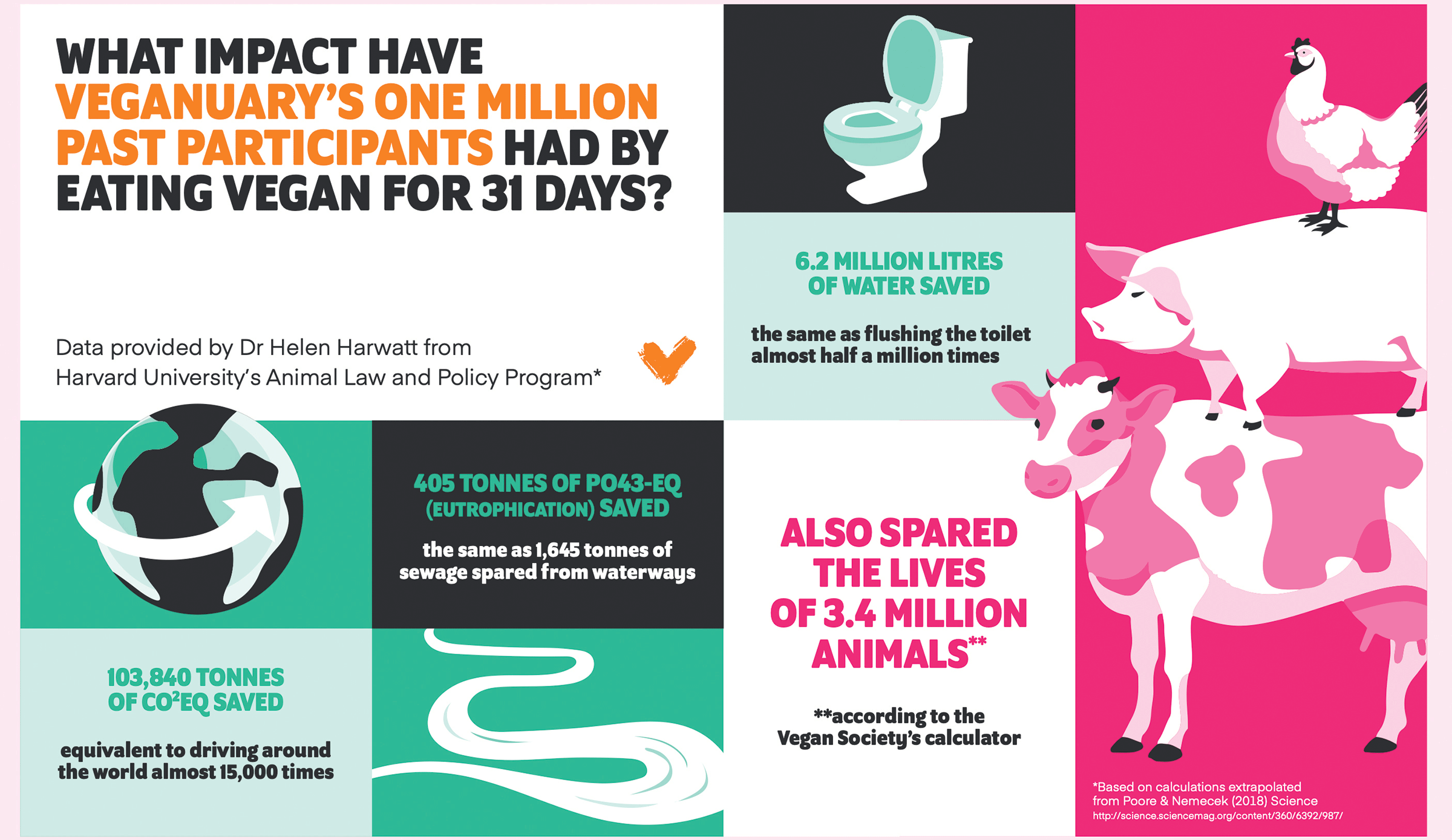
Ditching the meat
Research by Merchant Gourmet, the Leatham brothers’ plant-based brand, shows that more than half of Brits would ditch their favourite meat meal in favour of plant-based alternatives.
If every person in the UK replaced one more red meat meal per week with a plant-based dish, it would reduce the UK’s greenhouse gas emissions by 50M tonnes, equivalent to taking 16 million cars off the road.
More than half-a-million people signed up with Veganuary in the first few days of this year – double the number of people who took part in 2019.
Regional research showed that:
- Wales (47%) was most likely to consider trying out plant-based in January, followed by London (43%), North West (41%) and East Anglia (36%)
- London was most money conscious with 28% saying that they are more likely to go plant-based due to financial reasons, followed by the North East (27%) and then North West (26%)
- London (47%) is the most likely region to cut down on meat in 2021, then Wales (42%), South West (42%) and Scotland (39%)
- Wrexham has the most meat eaters in the UK with 52% eating meat every single day. However Aberdeen is less likely to eat meat every day at 25%

Supplements in demand
The IRI data Market Flash Report, providing data to week ending Dec 12, shows that VMS sales are 23.9% up on the same period last year, demonstrating an upturn in the market throughout the COVID pandemic.
And early indications from the new HFMA Health of the Nation Survey 2021 show that nearly 20 million people in the UK are now taking food supplements on a daily basis.

Healthy rise in snack purchases
Tree of Life noted recently that healthy snacks have seen dramatic growth during pandemic lockdown periods as consumers seek an antidote to stress, boredom or lack of energy.
The wholesaler quoted Kantar data showing that snack sales have surged more than a quarter since the lockdown in March 2020, equating to an extra spend of £133.2m. This boost in sales may have been initially dominated by more indulgent products, but bolstered by the evidence linking increased BMI with poor COVID-19 outcomes, health is now firmly back on the agenda.
New research into healthier snacking commissioned by Eat Real shows that while great taste is now the top key driver for purchase (81%), people are also looking for lower fat content (80%), no artificial flavourings, colouring or preservatives (80%), and natural ingredients (79%). Healthier snacks delivering taste without compromise was also highly rated (79%).
Helen Pomphrey, Marketing Director at Eat Real, says: “Historically, the health & wellness category has translated into ‘compromise’ for many people with a general perception that healthier snacks won’t taste as good as less healthy options. But the availability now of so many great-tasting, healthier snacks is rapidly dispelling that particular myth.”

Educated consumers seek out waste-free food
The UK’s health food retailers have been at the forefront of waste-free dispensing for a couple of years now, so it is no surprise that foodmatters.com made this observation in January:
“Waste-free foods will be the next big thing in 2021, with many turning to bulk-buy and plastic-free shops, growing their own foods out of wastes, and taking steps to reduce the carbon footprint of their food miles. It’s a powerful movement and it’s only going to grow.”
Reducing their carbon footprint will be top-of-mind for many consumers, with cutting back on meat consumption while buying from local sources certainly a priority.
Last year saw a 30% increase in search interest around sustainable eating, including issues such as beef carbon footprint and using a climate change food calculator (source: Google Keyword Planner, global, June–Sept 2020).
With endless information at their fingertips, consumers are more educated about the entire supply chain and its impact on the environment and humanity. They are keen to support the most sustainable retailers with their wallets and are pushing governments to pass laws that encourage sustainable practices.
The sense of urgency around preserving the environment and human rights will only grow. Wise health food retailers are ahead of these demands and are evaluating each of their processes to ensure they are implementing ethical practices.
Better Food, which has a trio of stores in Bristol, brought January sales to its refills by offering 25% off everything in its packaging-free wall.

Ethical indulgence
Chocolate is an indulgence, but at what cost?
A Harris Interactive survey of consumers in September 2020 revealed that 57% of consumers were either very or quite concerned about the ethics of their chocolate, increasing to 65% of 18-24 year olds.
Consumers are looking for chocolate brands that align with their own ethical stance and brands that state their ethical certification or credentials clearly on their packaging or through their marketing and advertising are clearly winning in today’s era of concerned consumerism.
Tree of Life’s snack report 2020 made this observation: “Concern over a brand’s ethics is possibly more prevalent within chocolate than any other snacking category as it relies heavily on the production of cacao in developing countries such as Ghana, Cote d’Ivoire and Peru, which have historically been linked to issues such as very low wages for the farmers, poor working and living conditions and even child labour.”
Time to indulge ethically...

Beauty’s healthier winners
Heightened hygiene and increased time at home have helped to revive British women’s interest in facial skincare routines with cleansers and moisturisers proving to be beauty winners, according to the latest research from Mintel.
This is what Mintel discovered among women choosing facial skincare products:
- 34% of female consumers prioritise how 'healthy' the formula is
- 21% of female consumers prioritise how environmentally friendly it is, and
- 20% prioritise how ethical the brand is.
Additionally, the consumer research giant reveals that green and ethical concerns are high, with a recent report showing that 28% of women have purchased eco-friendly facial moisturisers and treatments while 40% of women have increased their purchase of eco-friendly beauty and grooming products.
Multi-use products could also see appeal in facial skincare with 48% of women buying fewer products to reduce the environmental impact of their routine. With makeup routines in decline (from Mintel’s Colour Cosmetics, Impact of COVID-19, UK July 2020), hybrid skincare products and tinted lip balms will have appeal as women look for products that enhance their natural beauty.
UK consumers spent £1.18bn on women’s facial skincare in 2019.
Visit Mintel.com.
Finding positives in a crisis
Coinciding with its industry-first consumer engagement campaign HealthyDoesIt (see next page), the Health Food Manufacturers’ Association (HFMA) has revealed that sales of natural health foods, vitamins and supplements rose by 21.8% in August as consumers increasingly recognise the value of investing in their health naturally.
And at a recent meeting the HFMA Council approved the membership applications of eight companies – two of them major companies in the sector, Weleda and A.Vogel, returning to membership.
Two recent Government initiatives, #ShopLocal and ‘Tackling Obesity’, are acutely relevant to both ‘HealthyDoesIt’ and the work of the HFMA on behalf of its members, including successfully lobbying the UK Government to keep health stores open as a vital part of the country’s health and economy during lockdown.

Pandemic’s silver lining
Mintel's report on the UK's specialist health food market, released in March, notes that while VMS is estimated to have declined by just under 1% in 2019, Covid-19 will almost certainly have reversed that trend.
VMS had been experiencing healthy growth since 2012 but had slowed before the pandemic as the segment "potentially" approached maturity with consumers shifting their focus to maintaining an overall healthier lifestyle and diet rather than relying on supplements.
But now Mintel is expecting to report an increase in use of vitamins and supplements at least between March and June this year.
Other trends include:
- High protein gaining popularity to the detriment of sports nutrition – 72% of UK adults agree that eating enough protein is essential for maintaining a healthy diet
- Free-from food and drink grew 15.8% in 2018 and a further 10.6% in 2019
- Raw food snacks, weight-loss products and herbal/homeopathic remedies all increased in popularity
With inflation slowing to levels below average wage growth, increased disposable income would benefit specialist health stores, said Mintel, although the report was released before the reality of looming recession was fully realised. This may of course be offset by a new consumer awareness of the importance of diet and nutrition in the face of a global health crisis.
"With the trend towards increasing health and wellbeing, and with the rise of veganism and plant-based alternatives, we believe the market for health foods will continue to experience growth," the report says.
"The prospect of getting qualified expert advice remains the predominant factor encouraging shoppers to visit a health food specialist."
Access the report at store.mintel.com/uk-health-food-retailing-market-report.
Read our Shopping trends article 'Organic, ethical, healthy and local' here.
Vegan appeal
The prospect of a diet packed with chickpeas, lentils and quinoa appears to be more tempting as of late, new research from Mintel reveals that a quarter (25%) of young British Millennials (aged 21-30) say that the Covid-19 pandemic has made a vegan diet more appealing.

Demand for organic reaches 3-year high
Since January, organic sales have seen the highest growth since December 2016, the latest Nielsen data reveals.
Organic food and drink sales have grown by more than 6% year-on-year, almost double the growth of non-organic food and drink products (3.2%) for the 52 weeks ending May 30.
Nielsen data shows an 18.7% increase in organic sales in the 12 weeks ending May 30, which includes 10 weeks of lockdown, compared to a 14.2% increase in non-organic food and drink.
This comes at a time when external events have fast-tracked already changing shopper behaviour towards personal health, transparency and integrity. A YouGov survey commissioned by the Food, Farming and Countryside Commission and The Food Foundation revealed 42% of people feel the crisis has made them value food more.
These changing attitudes seem set to support the organic sector in exceeding the market value of £2.5bn projected by Soil Association Certification for the end of 2020, with the sector now on track to hit the £2.6billion mark.

The coming decade
Consumer research giant Mintel has identified three key trends that will shape the global food, drink, and foodservice industries over the next 10 years:
- Change, Incorporated: Successful companies will be those that improve the health of the planet and its population.
- Smart Diets: Technology will enable consumers to construct hyper-individualised approaches to physical and mental health.
- High-tech Harvests: Consumer trust in food science and technology will strengthen as these become vital tools to save the food supply.
Read the full story here...
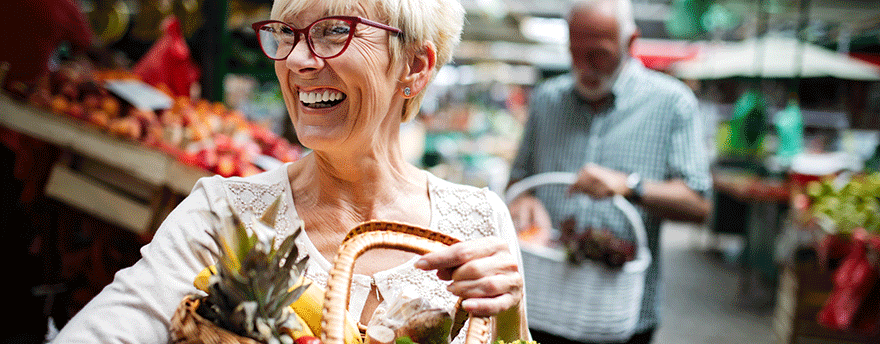
UK organic market grew 4.5% in 2019, Soil Association report reveals
Soil Association Certification’s annual Organic Market Report 2020 reveals that the market continued its strong growth in 2019, up 4.5% to reach a record £2.45bn. The UK organic market is on target to hit £2.5bn by the end of 2020.
Around £200m a month is now spent on organic food and drink as the rise of the ‘conscious consumer’ sees shoppers making two more trips to buy organic than they did five years ago.
The report shows growth across all areas, including supermarkets, home delivery, foodservice and independent retail, as demand for organic continues to increase across the UK.
Read the full story here...
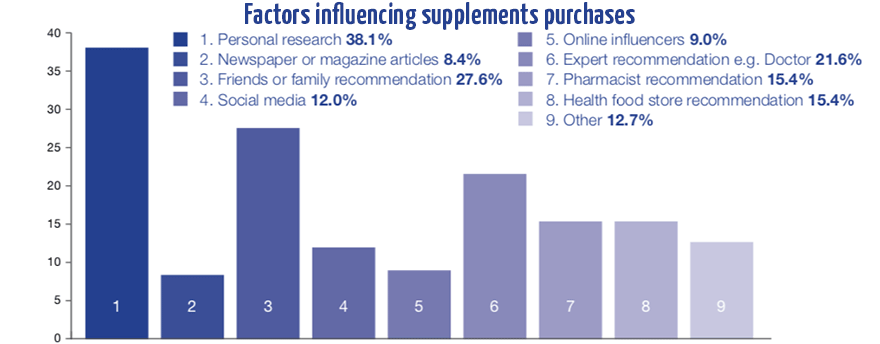
From the HFMA Health of the Nation report
Natural products industry gets a health check
Although more people are taking food supplements than ever before, the amount spent on keeping healthy remains low.
That’s the key conclusion of the 2019 Health of the Nation survey, one of the largest of its kind, conducted by the Health Food Manufacturers’ Association (HFMA).
More than 55% of UK adults have started taking supplements since the last survey in 2016, with more than a quarter starting in 2019. The figures show a rise to 69% of the adult population taking food supplements compared with 59% in 2016, 41% on a daily basis.
Read the full story here...

UK’s escalating child health crises
A ‘State of the Nation’ report focusing on child health highlights an escalating obesity crisis and what the UK should do about it.
Presented by Food for Life, a Soil Association initiative to make it normal for Britain’s children to eat healthy, nutritious food, the report spells out a five-point plan aimed at tackling the inter-related crises of climate, nature and health.
“These recommendations highlight the value of real, fresh food, which is often overlooked in the hype around obesity and calories,” says Soil Association CEO Helen Browning (pictured right). “They are attentive to the voices of young people, and I am convinced they will provide vital impetus towards the task of transforming children’s food in England for the better.”
Read the full story here...

Stand by for the vegan backlash
Retailers can expect a ‘vegan backlash’ in which health-conscious shoppers rebel against bandwagon products of questionable nutritional value.
Food consultant Simon Wright, one of several commentators making predictions ahead of Natural and Organic Products Europe 2020, believes health and eco-conscious individuals turning to a vegan diet have seen that too many products are highly processed, of questionable nutritional value, and use unsustainable/unethical ingredients.
Read the full story here...
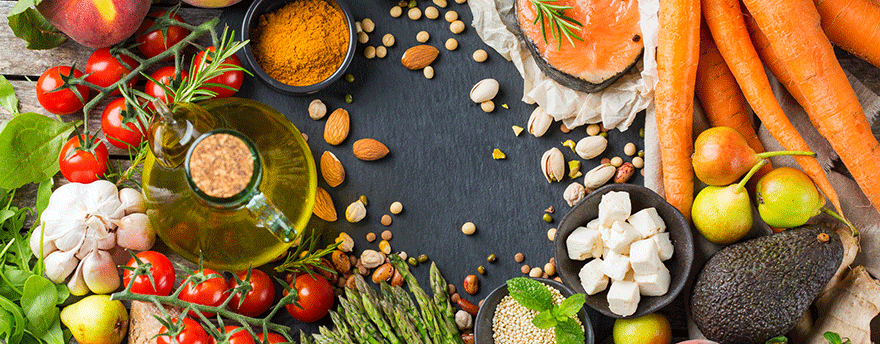
‘Flexitarian’ diet leads the nation’s changing choices
According to new research, UK shoppers spend £25 a week on vegetarian and vegan products, totalling £1.3bn a year.
Retail shopping app Ubamarket quizzed more than 2,000 UK adults to reveal how dietary trends are reshaping the retail industry.
Read the full story here...

Mintel says it’s no longer good enough just to be meat-free – new products must be healthier
Almost a quarter of new UK food product launches in 2019 were labelled vegan and almost a third of people believe eating less meat makes them healthier.
With sales of meat-free foods set to exceed £1.1 billion by 2024, market research giant Mintel says the nation is hungry for meat-free food. But a senior analyst says companies must be transparent about healthier food.
Over the past two years, the proportion of Brits who have eaten meat-free foods, including meat substitutes and ready meals, has shot up from 50% in 2017 to 65% in 2019. Meanwhile, sales of meat-free foods have grown by an impressive 40% from £582m in 2014 to an estimated £816m in 2019.
Read the full story here...

What kind of health food brands will win this decade?
The winners in the coming decade will be companies that produce products designed to improve important issues in society. Alex Beckett, Associate Director for Mintel Food & Drink, says health, technology and trust will inspire formulations, packaging and marketing in the years to come.
“In the next decade, consumers will be hungry for leadership and demonstrable change on environmental issues, ethical business practices, public health and other important causes,” says Beckett. “Consumers will reward brands that take action and improve important societal issues.
Read the full story here...

How social media has changed retail business
Offering customer service on social media is becoming increasingly important for connecting with customers. With three billion social media users globally and an average 100 minutes a day spent by active users, the dynamics of doing business has changed in the last decade.
According to figures produced by social media training and resource specialist Maybe, social media users grew by 328m between October 2018 and October 2019 (Source: Brandwatch). If an estimated 67% of consumers now use social media networks like Twitter and Facebook to connect with brands and retailers, are you on their wavelength?
Read the full story here...
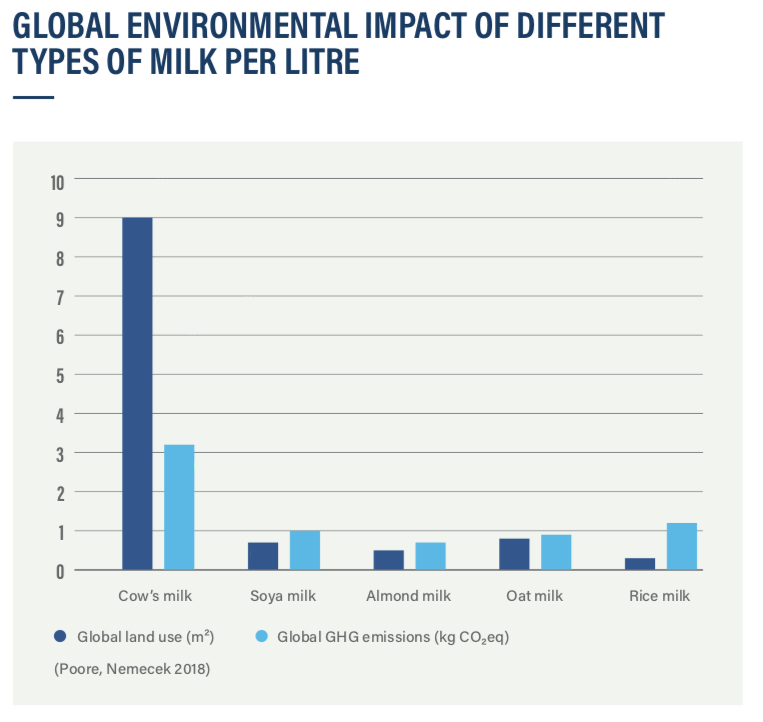
From the ProVeg report
ProVeg puts the plant milk case
International food awareness organisation ProVeg has produced a 30-page report on the global rise of plant milk, highlighting the reasons for the staggering growth of soya, almond, oat and coconut alternatives.
Of all the plant-based product categories, plant milk has the highest market value and penetration. In the US, in the year leading up to June 2018, sales of plant-based milk rose 9%, while sales of traditional cow’s milk declined 6%, resulting in plant milks accounting for 15% of total milk sales.
Read the full story here...

Shoppers demand the human touch
Shoppers want more face time with staff who can offer a combination of social and functional skills alongside product expertise, the latest report from RetailEXPO (London Olympia April 29-30 2020) has revealed at a time when record numbers of customer-facing UK retail jobs have been axed.
Original research of 2,000 UK consumers in the show’s 2020 Vision report revealed that over 64% of UK consumers say highly skilled store staff that deliver better service and in-depth product information make them more likely to visit a retail store. And 75% of consumers say good customer service encourages them to spend more.
Read the full story here...

Finding positives in last year’s retail sales decline
Retail sales fell for the first time in 25 years last year, marking the first annual sales decline since 1995. The number of big retailers and brands that have faced declining sales or closures on the high street in 2019 mirrors this.
Last year, the Treasury committee called for a review on business rates to make the high street more competitive again. But the solution needs to be more radical than anything offered so far.
Read the full story here...

A diet by any other name?
A poll has revealed the on-off dieting culture is to blame for over 60% of people regaining weight after dieting just for a special event such as a holiday, post-Christmas or a wedding.
With 82% of the country admitting to having been on a diet (87% women, 75% men), and over half (55%) starting one in January, it’s hardly surprising that entering a new decade would be any different.
Read the full story here...

Are millennials the unhealthiest generation in history?
Longer working days, high levels of stress and poor diet are fuelling a health crisis for millions of young people – a fifth of millennials (aged 22-38) report they don’t know how to take care of themselves properly.
A recent study has suggested that despite still being a part of the younger section of society, the millennial generation is actually less healthy than Gen X (40-54) were at the same age. Millennials are often associated with health and fitness trends such as yoga and meditation but have also seen the highest levels of asthma and allergies ever recorded.
Read the full story here...
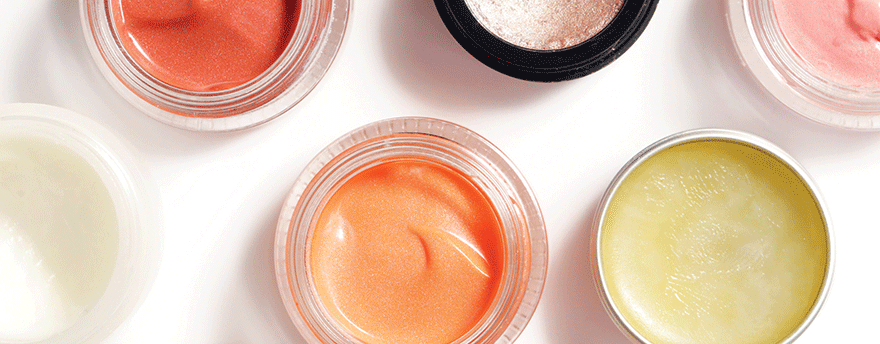
Probiotics for allergies & skin irritations
Market analyst Lumina Intelligence’s 20-country survey of online offerings found approximately 120 probiotic topical cosmetic products and about 25 orally ingested probiotic food supplements targeted at those with allergies, eczema or other skin irritations including acne.
Naming this niche category as ‘skinbiotics’, Lumina identified the number of online customer reviews of probiotic cosmetics doubling in 2018.
A select few probiotic strains including L. fermentum and L. rhamnosus dominate in all skin care products. Multiple strain offerings are less noticeable than in other probiotic sectors such as irritable bowel syndrome (IBS).
The category benefits from being widely perceived as ‘natural’ with 67% of probiotic cosmetics boasting a ‘clean label’ and/or vegetarian and free-from.
Clearer allergy labelling essential
The number of hospital admissions of children suffering severe allergic reactions has risen by 72% in the last five years, according to NHS figures. Just under 1,750 children were treated for anaphylactic shock in 2018-19, up from 1,015 in 2013-14.
This underlines the importance of clearly labelling pre-packed foods to guard against allergic reactions from all 14 major allergens.
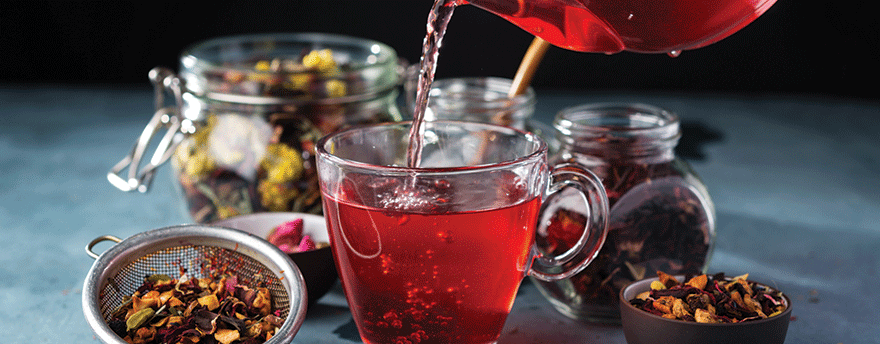
Something’s brewing
National Tea Day conducted a survey of Tea Brands ahead of National Tea Day (April 21) and found that tea is on a rapid rise due mainly to a large 50% growth in consumption in the 24-35 age group. Meanwhile the 36-54 age group had a solid 25% increase in consumption.
The UK consumes 165m cups of tea per day whereas coffee consumption is significantly lower at 95m cups per day. Consumers are also becoming more conscious of consuming quality-sourced, healthy and great tasting products.
nationalteaday.co.uk
Rise in allergy disorders
Max Wiseberg, MD of HayMax allergen barrier balms, refers us to figures showing the dramatic rise in allergies and the link to eczema and asthma.
“The number of people living with allergies in the UK is rising by 5% every year,” he says. “In the UK, about one in three people have an allergic disease and 40% of children have been diagnosed with allergy in the UK, so allergies are now the most common chronic disorder in children.”
One in four people – that’s 16m in the UK – has hay fever. Each is four times more likely to suffer from other allergic conditions such as asthma, food allergy and eczema.
“Hay fever is often not recognised or treated seriously and is generally poorly managed,” says Max. “And the percentage of people diagnosed with hay fever, eczema and asthma has trebled over 30 years.”

Retailers should team up to meet rising demand for Click & Collect
Nine out of 10 retailers are planning to invest in Click & Collect services over the next five years with the market set to be worth almost £10bn by 2023. However, with store closures reshaping the nation’s high streets, businesses need to find new ways for shoppers to collect parcels.
That’s the conclusion of Barclaycard’s latest research which also reveals that six out of ten consumers want retailers to partner together so they can collect purchases in more locations. More than 80% of shoppers buy additional items in-store when using Click & Collect, while more than three quarters of retailers say providing the service reduces return volumes.
Read the full story here...

Is there a future for cash in the retail sector?
Debit cards are the most popular form of payment as falling cash use pushed notes and coins down to third place.
Credit and charge cards accounted for £82bn, or 22%, of retail sales in 2018, outstripping cash (£78bn) for the first time, according to the British Retail Consortium. Spending on debit cards totalled £216bn.
Read the full story here...

Researchers seek CBD solution for Parkinson’s psychosis
A pioneering clinical trial is to investigate if cannabidiol (CBD) can treat hallucinations and delusions in people living with Parkinson’s.
Parkinson’s UK, Europe's largest charitable funder of Parkinson’s research, is backing a world first clinical trial at King’s College London (KCL), which will test whether CBD is safe and effective for treating Parkinson’s psychosis symptoms.
Read the full story here...
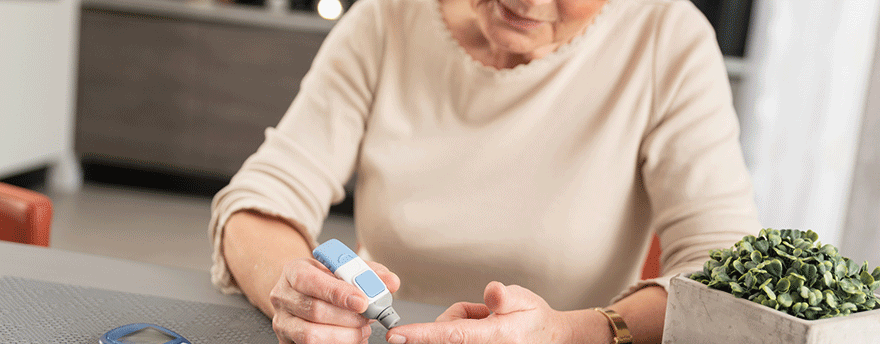
Diabetes and the family connection
A study surveying 4,300 family members of people living with diabetes, published in Diabetes Therapy, shows that hypoglycaemia, also known as ‘hypos’ or low blood sugar, can be perceived as a substantial burden by family members of people with diabetes.
Almost two-thirds (64%) of family members of people with diabetes report being worried or anxious about the risk of hypoglycaemia. Added to this, 74% of the study participants that were helping their relative with diabetes to manage their hypos, state that they spend less time on, or forego entirely, other activities such as hobbies, holidays or being with other friends or family as a result.
Read the full story here...

Menopausal women being prescribed ‘inappropriate’ antidepressants
Over a third of women visiting their GP with menopausal symptoms are being offered antidepressants despite the majority (80%) feeling the treatment is ‘inappropriate’ for their symptoms.
The What Women Want at Menopause survey shows that women are increasingly reluctant to visit the doctor over fears they will not receive the right advice or treatment, as choices of medication for menopause are limited.
Read the full story here...
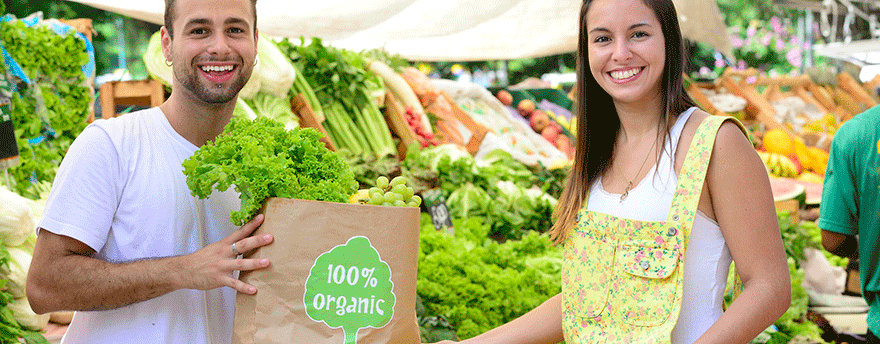
Young consumers are willing to pay more for organic
Latest research from Mintel revealed at the Anuga Food Fair 2019 shows there has never been so much choice for organic food and drink.
According to the Mintel Global New Products Database the total number of new food and drink product launches globally with an organic claim has risen from 6% to 10% between August 2009 and July 2019.
Read the full story here...

“Organic can lead the way” – Soil Association annual conference
Around 200 delegates from across the organic industry attended Soil Association Certification’s annual Organic Trade Conference in London in October.
The conference, titled ‘Together we can make a world of difference’, hit an optimistic note for the future of organic and the potential for a united market to resonate with an increasingly “environmentally aware” public.
Read the full story here...

A third of UK grocery shoppers prioritise planet over price
Ethical and sustainable issues are driving changes in food shopping. Almost two thirds of Brits (32.2m people) now consider themselves ‘ethical or sustainable grocery shoppers’, and 36% say ethical or sustainable considerations are the most important factor in their shopping.
Research of over 2,000 UK shoppers by natural food company Wessanen UK found that:
Read the full story here...

Retailer confidence is at a three-year low
The British Independent Retailers Association’s business confidence barometer, which forms part of Bira’s annual Wages Survey, showed 50.8% of retailers are feeling anxious, which is significantly higher than in 2018 (40.83%). The number of retailers feeling very confident showed a decline too, with only 7.1% feeling very confident, which is down on 2018 and 2017 (8.28% and 12.5%).
The Wages Survey is an annual questionnaire of Bira’s membership to gauge how employment costs are affecting their businesses and also to see how confident they are about the future. The National Association of Health Stores is a member of Bira.
Read the full story here...

Health & beauty goes top
GlobalData research shows that Health and Beauty is now retail’s fastest growing sector. Add to that the consumer drive for sustainability and naturalness, and health stores can put themselves in pole position.
The analyst says the sector is set to grow by 16.5% until 2023. Meanwhile another data company, Statista, found that the market value for beauty and personal care reached around £14.7bn in 2019 and is likely to grow by over £15bn next year.
Read the full story here...
Pet nutrition to grow as animal feed gets healthier
Pet nutrition is expected to expand globally at a compound annual growth rate (CAGR) of 5.5% over the next six years, according to market analyst Frost & Sullivan.
Increased awareness among pet owners about the health of their pets is one reason why the total market for animal and pet nutrition ingredients is expected to grow from $16.6m in 2018 to reach $24.2m by 2025.
“The practice of supplementing diets with additives such as vitamins, amino acids, organic acids, enzymes, and probiotics is expected to intensify,” says Smriti Sharma, industry analyst at Frost & Sullivan.
Overcoming the hassle of click-and-collect
Two out of five shoppers say they would visit the high street more often if click-and-collect was improved, according to technology consultancy Fluent Commerce.
Despite converse data showing that some consumers find click-and-collect is “too much hassle”, Fluent’s Rob Shaw believes it provides an opportunity for retailers to compete in today’s hostile environment for high street shops.
“By optimising click-and-collect, retailers will benefit from additional revenue brought by those collecting goods who might then purchase additional items in-store,” he says.

UK consumers switch on to CBD
Well over half of UK consumers who have taken CBD-based products are likely to use them again. New research of 4,451 Internet users by GlobalWebIndex reveals 58% would come back for more.
Meanwhile, 68% found CBD products to be effective in alleviating symptoms of physical pain, such as cramps and muscle soreness, as well as mental health conditions including anxiety and depression. In the US, this figure rises by 16 percentage points.
Virna Sekuj, Strategic Insights Manager at GlobalWebIndex, comments: “Interestingly, UK consumers appear to be in a more experimental phase of trying CBD oil in various forms. While CBD is taken primarily via oral supplements in the US (45%), in the UK, 35% have consumed CBD in chocolate and 32% have inhaled CBD through a vape pen.”
Read the full story here...

Caring consumers look for ethical certification
British consumers are increasingly eating with a conscience as the latest research from Mintel reveals that last year the nation spent £8.2bn on ethical food and drink. Over the past five years, sales of ethical produce – especially products certified organic, Fairtrade, Rainforest Alliance and Marine Stewardship Council (MSC) – have shot up by 43% from £5.7bn in 2013.
Mintel forecasts sales will increase a further 4% to reach £8.6bn this year and by 17% to reach £9.6bn by 2023. Today, 83% of UK adults say they have bought food/drink with ethical certification with those most likely to buy ethically-certified food/drink aged over 55 (87%).
But while ethical food and drink is growing in popularity, Mintel reveals that cost is a significant barrier, as seven in ten UK adults say that eating sustainably/ethically is harder when money is tight. Confusion is having an impact too, as 60% of UK adults say it’s difficult to understand the differences between the various sustainable/ethical schemes.
Read the full story here...
Bank spells out its vision for healthier farming
Modern farming systems, currently dominant in western economies, have serious negative consequences. They cause severe soil degradation – over 50% of global arable land is degraded.
Biodiversity loss is a major issue as indicated by the 75% decline in flying insects over the past three decades, according to research conducted in Germany. Water depletion occurs with agriculture accounting for 70% of global freshwater withdrawals.
And farming has high greenhouse gas (GHG) emissions where between 20-30% of global GHG emissions are related to agriculture. This is because modern farming systems depend heavily on synthetic inputs, adopt limited diversity, produce for global markets and have a high weighting towards livestock.
Read the full story here...

Health stores handed a role in Social Prescribing project
The NHS frontline is changing with GPs under increasing pressure to cope with daily demands on their time. People are living longer and as they get older are developing long-term health conditions. Their health is affected by a wide range of factors including employment, housing, debt, social isolation and culture.
These factors are not amenable to traditional health interventions. The NHS England Five Year Forward View calls for a radical upgrade in prevention and public health, and greater engagement with people and communities to harness the energy and potential they have.
In June, the Health Food Institute invited Dr Michael Dixon, Chair of the College of Medicine and personal physician to Prince Charles, to present the opportunities presented by “Social Prescribing”, a national project which he also heads.
Read the full story here...
Getting tangible results from in-store promotions
The high value of retailer support programmes is revealed in figures from a leading VMS supplier. Loyalty cards and staff training combined with striking POS are returning some startling figures in UK independents.
Solgar reports that stores implementing its Gold Card loyalty card programme are seeing an average 20% increase in sales, while its ‘staff recommends’ scheme has shown a huge 36% increase in one store. Stores engaging with the Solgar Academy, which provides specific training on product sectors, are seeing similar results across the board.
This emphasis on training enables staff to identify opportunities and make recommendations that heighten the shopping experience as well as increase sales and cash margin.
Read the full story here...

How to improve on the 7% spike in organic sales we saw last September
In 2018, retailers, consumers and businesses got involved with demonstrations, talks, sales offers and social media during Organic September. More than 200 independent retailers took part in Organic September Saturday. This all led to a 7% spike in sales of organic during that month.
The Soil Association has announced plans to beat that figure this year and show consumers the positive impact organic can have on the planet.
From the food we eat, to the beauty products we use and the clothes we wear, going organic has a positive impact on our planet. We’re in a climate emergency and this Organic September will show how choosing organic is a simple but powerful form of direct action:
Read the full story here...

Flagging Brits know what they need
Market research by UK oatcake producer Nairn’s has revealed that although many Brits are suffering from a bad case of lethargy, most of them know what to do about it.
Data researched in June has found that we are most energised at 11am but by 2pm, just three hours later, we’re already flagging. What’s more, people don’t have enough energy to get through the day at least three times a week.
Nairn’s asked respondents what they thought they should do about it. Four-fifths (80%) believe taking better care of themselves would lead to feeling more energised. But a conundrum arose from the next question: almost three-quarters (71%) admit they would be more likely to challenge themselves to do more physical activity if they didn’t feel so lethargic!
Read the full story here...
Where does the snacking market go from here?
Less sugar, more protein and an expectation for healthier/more natural products are a major influence on snack and food-to-go choices. So is demand for flavour innovation and new packaging formats. Products that embrace all these attributes are performing particularly well – these are the key points in a white paper by brand design agency Brandality.
In the cereal bar category, now a key feature of any snacking/impulse fixture, the most successful brands play to their strengths such as no added sugars, lots of natural/plant proteins and minimally processed.
Kantar Worldpanel puts the healthy snack bar market, including cereal bars, at approximately £365m, with more than half a million more shoppers buying into the category and a household penetration of 61%. Last year, Nielsen reported that 40% of consumers say they would expect to pay more for a premium, healthy and functional snack.
Read the full story here...

Crystal clear – beauty consumers are switching to new age philosophies
Market analyst Mintel, normally preoccupied with FMCG shopping trends, says consumers are turning to crystal healing as part of their beauty regime.
Brands are exploring the spiritual properties of crystal healing to create beauty products with emotional benefits, says beauty specialist Irina Ene, creating self-care rituals that elevate topical treatments to overall wellbeing boosters.
“Despite a lack of scientific backing, new-age philosophies are gaining momentum in an environment where consumer interest in emotional and spiritual self-care is closely linked to physical and mental health and overall wellness,” she reports. “Following centuries of Eastern tradition, healing crystals and energy cleansing have become popular methods of promoting emotional health.
Read the full story here...

Plastic packaging – are you ahead of the supermarkets?
It’s probably not hard for independent health stores to lead the way in reducing plastic packaging and waste, but thanks to a Which? campaign the supermarkets may be forced to up their game and make recycling easier for all.
Almost half of packaging used by major UK supermarket chains cannot be easily recycled, an investigation by the consumer champion found. In your own audit as an independent, ethical retailer, how does your store compare with these findings following the Which? investigation?
Which? analysed the packaging of a typical household shop of 46 of the most popular items from Aldi, Asda, Co-op, Iceland, Lidl, M&S, Morrisons, Ocado, Sainsbury’s, Tesco and Waitrose. Researchers broke down each item’s packaging into its component parts and assessed whether each piece could be easily recycled.
Read the full story here...
What consumers want retailers to do about climate change
Almost 80% of UK consumers think that retailers are not doing enough to address issues around sustainability and climate change, according to GlobalData.
The data and analytics company’s latest report, UK Sustainability 2019, reveals that those who are most likely to purchase more frequently are often more engaged with sustainability and ethics, as many consumers wish to pass the responsibility on to retailers.
However, these young individuals may be the ones who are less able to make changes due to the often higher price points associated with sustainable and/or ethical products. Price is an important factor that many consumers are not willing to compromise on and a barrier to making more sustainable choices, says the report.
Read the full story here...

‘Digital natives’ value brick-and-mortar stores more than their parents
Despite clear differences in expectations among shoppers of different generations, almost half of retailers (44%) have made no progress in tailoring the in-store shopping experience, according to a study conducted by Oracle NetSuite, Wakefield Research and The Retail Doctor.
The global study of 1,200 consumers and 400 retail executives in the US, UK and Australia found big differences in generational expectations across baby boomers, Gen X, millennials and Gen Z.
“We have seen decades of diminishing experiences in brick and mortar stores, and the differences identified in these results point to its impact on consumers over the years,” said Bob Phibbs, CEO of The Retail Doctor. “Retailers have fallen behind in offering in-store experiences that balance personalisation and customer service but there’s an opportunity to take the reins back. The expectation from consumers is clear and it’s up to retailers to offer engaging and customised experiences that will cater to shoppers across a diverse group of generations.”
Read the full story here...

Search for Britain’s Best Small Shop of 2019 gets underway
The annual search to find Britain’s Best Small Shop, a competition managed by the Independent Retailers Confederation (IRC), has begun with a focus on consumer engagement and how independent retailers promote all that is special about their businesses to the local community and consumers at large.
Celebrating personal commitment, innovation and community engagement, the Best Small Shops competition recognises the contribution of independent retailers on the UK’s high streets and shopping parades. The 2018 competition had “by far the biggest impact of anything we have been involved in before”, said 2018 winner, Rosamund de la Hey of The Mainstreet Trading Company.
The competition is open to any UK independent retailer selling goods or services to the public. It closes in early September and a shortlist of the most impressive applicants will be invited to attend the competition reception at the Houses of Parliament in November, where they will have the opportunity to meet with MPs, trade representatives and other shortlisted retailers, before the winner and runners-up are announced.
Read the full story here...

More consumers are seeking energy supplements
Global research shows that the number of people taking a daily supplement has increased by almost 10% in two years.
More than 25,000 people from 23 companies were quizzed by nutrition giant DSM in 2017 and this year, revealing that the numbers taking supplements every day has leapt from 28% to 37%.
The figures also revealed that weight loss is no longer among the top health concerns while those leading a busy lifestyle have pushed energy supplements into the top three sub-categories.
Read the full story here...

A third of Brits are looking for specialist vegan products
Research by ‘scan, pay, go’ app Ubamarket reveals the meat-free habits of UK consumers:
- Brits spend £25 per week on vegetarian and vegan products, totalling £1.3bn a year
- 36% of meat-eaters, representing almost 19m Brits, are buying vegetarian and vegan specialist products
- 23% – 11.77m – are stocking up gluten-free meals despite not having any intolerance
- 31% of Brits – 16m – are eating more vegetarian and vegan meals than ever before
- 32% of Brits – 16.7m – are consciously trying to eat less meat, for reasons ranging from their health to the environmental impact of the agriculture industry
- 26% of Brits said that trends like Veganuary and Sugar Awareness Week are shaping their shopping habit.

Half of British consumers would pay more for eco-friendly packaging
Eight out of 10 UK consumers are doing their best to slash their plastic waste, and 46% of them would pay more for eco-friendly packaging.
YouGov research highlighted in The Guardian indicates that households want to get behind the eco drive and by paying more will enable companies to find alternatives to single-use plastics.
Young people lead the way with 51% of respondents aged between 18 and 24 expressing a sense of guilt about environmental damage, not nearly so marked by consumers in their 50s.
Read the full story here...

Cut and dried – halting the decline in dried fruit sales
The UK’s leading dried fruit businesses have come together in a bid to dispel consumer myths around the consumption of dried fruit.
The Dried Fruit Alliance (DFA), consisting of Whitworths, Sun Maid, Californian Raisin Administrative Committee, the California Prune Board and the National Dried Fruit Trade Association, aims to re-educate consumers about the perceptions of the category, such as dried fruit being bad for dental health, for which there is no medical evidence.
Decline has been relatively modest currently at around -2.3% but has continued for the past few years, DFA told Better Retailing Magazine. However, this is contradictory to other categories with similar natural, unprocessed and high nutrition categories such as nuts or seeds, both seeing around 10% year on year over the past few years.
Read the full story here...

How much Brits spend on their health
The average Brit will spend more than £65,000 over their lifetime just looking after their basic health.
A poll of 2,000 adults found Brits spend an average of £1,091.26 each year on gym memberships, vitamins and supplements, prescriptions, exercise classes and healthy foods.
And over the course of a 60.3 year average adult lifespan, that adds up to £65,802.98. This figure does not take into account the £120bn we spend on the NHS each year – about £1,912 per person.
Read the full story here...

Stand by for the VMHS surge
The consumer health market for vitamins, minerals and herbal supplements is expected to grow by an average compound annual growth rate (CAGR) of 7.5% to 2023, according to figures provided by the Nature’s Bounty Company at Natural Products Expo in April.
This acceleration will be driven by demand for Vitamin D (+24%), probiotics (+21%) and protein (+17%) in particular, according to Paul Chamberlain, Category Development and Product Training Director. Quoting Mintel figures, he said even fish oils, which had shown a decline between 2014 and 2018, would grow by a CAGR of around 7%.
Multivitamins alone generated nearly £218m in value in 2018 but will grow to £320m by 2023, while vitamin D will grow from £15m to £45m in the same period. He said the Big Five sub-categories were general health with a £79m sales value in 2018, followed by joint and bone (£77m), women’s health (£57m), energy (£40m) and beauty (£39m), (source: Euromonitor).
Read the full story here...

Vegan, fermented food, beauty and CBD all boosted at Natural Products showcase
Natural & Organic Products Europe served up pioneering trends, thought-provoking debates and ‘better-for-you’ innovations in April. With 700 exhibitors showcasing the best choice of natural, certified organic, vegan, Fairtrade and free-from food, drink, VMS, cosmetics, skincare and eco living, the London trade show saw an attendance of 10,298 (up 3% on 2018’s figures).
“CBD was massive,” reported Lisa Gawthorne, MD of Bravura Foods. “The uncertainty surrounding the novel foods listing certainly doesn’t seem to be prohibiting innovation.” Fermented foods and drinks were popular, she added.
“Beauty seemed bigger than ever – it’s nice to see such a focus on ethical and cruelty-free beauty and displayed in a really professional manner.
“The show was the busiest we have seen it in years – everyone wants to talk anything vegan right now with it continuing to be the biggest food trend the market has seen.” Her presentation on vegan food was one of the best-attended talks, filled with retailers keen to find out more about how they can increase in-store sales of plant-based and vegan products.
Read the full story here...

Grocery continues its shift away from supermarkets
Consumer analyst Nielsen reported an April increase of 5.9% in consumer spending in the grocery sector but confirmed there was a continued shift away from the ‘big four’ supermarkets.
Unseasonably warm weather coupled with Mother’s Day and the late Easter bank holiday weekend all contributed to the improvement in sales growth. For the week ending Easter Saturday (20th April), overall sales peaked at +15% as shoppers bought into attractive seasonal offers that complemented the warm weather, both in store and online.
Tesco, Sainsbury’s, Morrisons and Asda saw their combined market share fall to 64% between February and the end of April.
Mike Watkins, Nielsen’s UK Head of Retailer and Business Insight, said: “The underlying trend here seems to be that economising rather than compromising is still the key consumer mindset. Looking ahead, it will be important for retailers and brands to keep up sales momentum through increased promotional activity as we head into the summer of 2019 in order to match the levels of last year’s hot summer.”
Read the full story here...
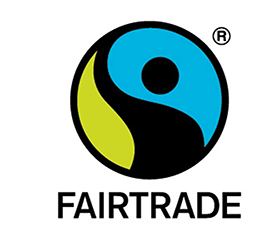
Fairtrade Fortnight success in numbers
Fairtrade Fortnight (end of February/beginning of March) attracted an additional 10,000 supporters and reached a million people through its campaign events. More than 50 Fairtrade partners were involved, while campaigners organised 4,000 events.
Kantar research revealed that nine out of 10 people are now aware of the Fairtrade mark and 35% remembered the Fairtrade message. Widespread media coverage was generated and 75 MPs attended the All Party Parliamentary Group receptions.
In April, the Government invited Michael Gidney, Chief Executive of the Fairtrade Foundation, to join the Government’s Strategic Trade Advisory Group to represent the voice of NGOs and the millions of farmers that the UK relies on across the world for produce.
Read the full story here...

A stigma that is more than skin deep
The social stigma around skincare conditions is steadily increasing. With the popularity of social media affecting mental health, and chemical companies increasingly promising quick-fix solutions, it’s no surprise that seven out of 10 Brits who suffer from skin care conditions report feeling self-conscious.
Research by Grahams Natural, an Australian therapeutic skin care company, explored how people are affected by common skin conditions such as eczema, psoriasis and rosacea. Shockingly, nearly one in three (29%) have been discriminated against and excluded socially because of the condition of their skin. Men with skin conditions are twice as likely to have felt this, with 38% reporting exclusion or discrimination, compared to 19% of women.
The self-consciousness brought on by these skin conditions also leads to deeper problems. Half of those that suffer with eczema, psoriasis or rosacea say they are anxious or depressed as a result.
Read the full story here...

Keeping an open mind on ‘fad’ diets
The high-fat, low-carbohydrate keto diet is enjoying spectacular popularity at the moment, but will it remain relevant in the years to come? Mintel’s Global Food Analyst Melanie Zanoza Bartelme believes it would be wise to keep an open mind.
“Walking around the floor at Natural Products Expo West in California this year, it was evident that keto was continuing its moment in the spotlight,” she said.
Read the full story here...

Growth of the 'Natural Health Service'
The number of Brits turning to natural remedies instead of visiting their doctor is growing with 21% turning to alternatives such as homeopathy, nutritional therapy, therapeutic massages and herbal tonics.
According to a study from the School of Health, 48% prefer to find their own remedies while the average Brit takes nine vitamin and mineral supplements a month.
One in five believe they have to see their doctor less because of the natural remedies they use to ward off illness. A further fifth is considering using herbal medicine, while 16% would experiment with homeopathy and 15% considering nutritional therapy.
Mani Norland, Principal at The School of Health, which commissioned the report via OnePoll.com, says: “Busy waiting times and overloaded medical professionals mean many people find it easier to fend for themselves.
“Add to this a growing mistrust of pharmaceutical companies, and it’s little surprise many adults are looking for more natural solutions to stay well.
“People feel more empowered to take responsibility for their own health and do their own research, and the survey shows that many choose natural medicines because they feel they are safer, less toxic with little or no side effects.”
www.schoolofhealth.com
Pack it in
In a survey of UK adults by delivery management company Whistl, 75% of respondents said they wanted e-retailers to minimise parcel packaging waste and use environmentally friendly materials for packaging their online purchases.

Seaganism makes a splash
First came the term ‘vegetarian’, then ‘flexitarian’ before ‘vegan’ became the hip foodie word of the decade. Now UK seafood authority Seafish has come up with ‘Seagan’ as part of a campaign to promote fish as part of a healthy diet when combined with plant-based dishes.
Chief Executive Marcus Coleman says: “The health benefits of eating seafood are well documented and, coupled with the benefits of a plant-based diet, seagansim presents a sustainable, tasty and flexible diet for people of all ages and stages of life. Our Think Seagan campaign will inspire and educate those looking to make changes to their diet.”
www.fishisthedish.co.uk
Environmental concerns
New Mintel figures show that more than half (55%) of UK buyers of soap, bath and shower products would consider buying products with reduced/no plastic packaging, rising to 68% of over-65s. Just under half (47%) are interested in buying refillable products and 42% would consider using products with an all-natural formula. Four in ten want palm-oil free products.
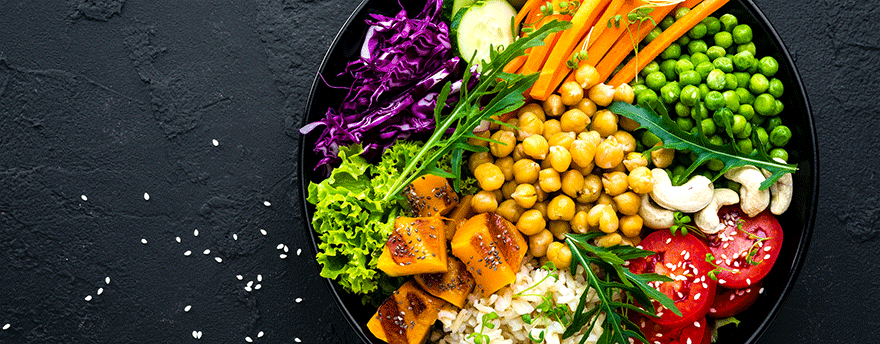
Vegan UK leading the way, but not quietly
A report commissioned by environment secretary Michael Gove shows the extent to which a vegan diet can have a real effect on greenhouse gases. Mintel says the UK has toppled Germany from its top spot in vegan new product development. A third of UK consumers reduced their meat consumption in the six months to July 2018.
All looking good so far if you exclude the megaphone warriors who picket our supermarkets, including Brighton’s HISBE which deserves better for its ethical and local standpoint. And as Veganuary draws to a close, hats off to the charity which has made a massive impact at the start of 2019.
Michael Gove’s report says that a population turning to healthy diets could result in a 12% reduction in greenhouse gases, moving to vegetarian 26%, and adopting veganism 36%. A pipe dream of course, but it shows the potential impact on food and farming when you consider that the UK generates the equivalent of around 1bn tons of CO2 a year.
Read the full story here...

Indies hold the whip hand in cosmetics sustainability
Beauty and personal care brands (BPC) must change their approach to sustainability and zero waste or die, according to Mintel’s 2019 Global Beauty & Personal Care Trends report.
“Some companies are already discussing totally circumventing packaging,” says Mintel. “This is not just a trend, it is a movement.”
Independent retailers already have the lead as big companies that put current profits ahead of investment in zero waste solutions will lose out in the long term. “Indie brands already have the edge as they have built their business practices around ethics,” says Mintel.
“High-profit BPC brands that aren’t investing in this area are already condemning themselves.”
Read the full story here...
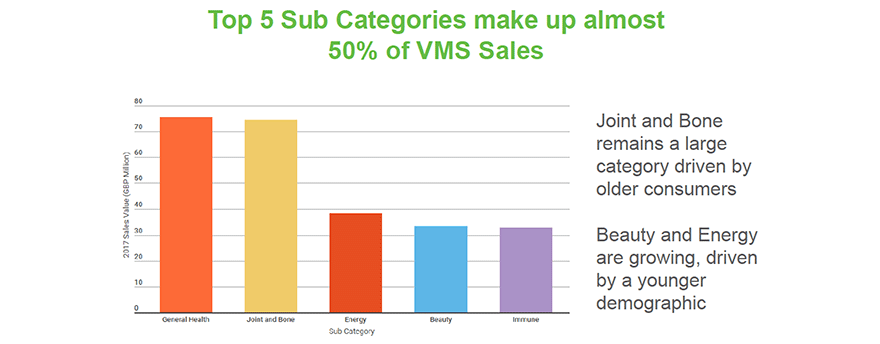
Source: Euromonitor
Why the VMS category is in good health
Modern lifestyles and growing health awareness are providing a rosy future for VMS sales, according to market research carried out for Solgar®.
Add to that consumer concerns about the side effects of medicines together with demand for ‘natural’ and ‘functional’ products, and the steady growth of the VMS and sports nutrition categories will continue.
Sales of vitamins and supplements are estimated to have reached £442m in 2018, a rise of 6% from £417m in 2013 (source: Mintel). The sector is predicted to see a steady rise in value sales over the next five years, with the market forecast to grow a healthy 8% to reach £477m in 2023.
Read the full story here...

Sunshine Vitamin named UK bestseller
Vitamin D has been crowned Britain’s favourite single vitamin supplement, overtaking vitamin C, following research by Mintel.
Sales rose a glowing seven percentage points in 2018, bought by 33% of VMS users, up from 26% in 2017.
While usage has ticked upwards for all age groups, people aged 35-54 were the main drivers, with usage rising from 22% in 2017 to 35% in 2018 among this group.
The UK’s top five single vitamin supplements are Vitamin D (33%), Vitamin C (27%), Vitamin B complex (15%), Vitamin A (12%) and Vitamin E (10%). Meanwhile, well over half (56%) of VMS users take multivitamins.
Read the full story here...

Why sustainability is changing retail businesses
Consumer sustainability focus will change the way retailers do business, according to Mark Childs, Senior Retail Consultant at digital services pioneer Capgemini.
The explosion in concern over plastic use has been impossible to miss in 2018 as public scrutiny of plastic waste and its widespread usage has reached mainstream consciousness.
“Within our industry, the problem of plastics has gone from an environmental niche to a subject that is firmly on the agenda of retailers and suppliers alike,” says Childs.
“A recent Greenpeace study found that 72% of consumers think supermarkets are not doing enough about packaging to tackle the plastic problem. As we enter 2019, the expectation for all retailers to develop a solution will only intensify, and the increasing sustainability awareness will require businesses to revisit their environmental goals and timelines.
Read the full story here...

What’s hot for health-conscious older people
Healthy ageing is emerging as a food and drink opportunity in 2019. Preparing for a longer, healthier lifespan is particularly relevant as consumers view health and wellness as a holistic, proactive and ongoing pursuit.
This is one of the findings in the Mintel Global Food & Drink Trends 2019 report, highlighting the importance of self-care, a habit identified in Mintel’s 2018 trends report.
Food and drink manufacturers can look to the beauty and personal care industry for inspiration for healthy ageing product development that is centred around positive language across life stages and age demographics, rejects terms like ‘anti-ageing’ for its negative connotations, and addresses longevity-related health concerns.
With more consumers taking an active interest in their long-term health, expect to see more ‘nootropics’, a broad group of supplements like L-theanine, B-vitamins, choline and omega-3s that claim to enhance brain power, focus, alertness and general wellbeing.
Read the full story here...

Buzzwords for 2019 – gut-friendly, vegan and ‘unpackaged’
Champion health blogger and author Fab Giovanetti spotlights the key trends for health food retailers in 2019.
At the end of 2017 we saw the rise of miso, kimchi and kefir products from artisan brands and bigger companies. As the BBC named 2018 as "the year of gut health" with a rise in pickled and fermented vegetables, the next step was meant to be affordable and easy-to-consume solutions for busy people. Brands like Happy Tummy Co are pioneering with ranges of food-to-go across London, and this is just the beginning of a new era for gut-health food. Gut-friendly food is a trend we'll still see going strong in 2019, with no sign of slowing down.
Boosting current products with healthy bacteria is something we can see happening in different areas of the supermarkets, getting the general public more and more accustomed to the idea, just like the first cultured ice cream by the Cultured Ice Cream Company. Dairy-free, grain-free, sugar-free creaminess made from cultured kefir coconut cream.
Vegan is a growing segment of the market – being vegan is all about being part of a community, something I know very well from the research I covered in the book Make an Impact, uncovering the six habits of highly influential people. One of those habits is nurturing and participating in a community with a mission that goes beyond the individual, which is something most vegans can easily relate to.
Read the full story here...
Loyalty, plastics, local and prices are key influences on retail in 2019
IRI, the analytics and insights provider for FMCG, OTC healthcare and retailers, has published its FMCG trends for the year ahead.
1. Loyalty programmes.

Paul Hinds, IRI’s Senior Vice President of International Retail Solutions, says: “It’s not loyalty, but impactful customer engagement that retailers need to focus on. Loyalty programmes remain an important component of the customer experience, but they are increasingly commoditised, with customer usage driven by habitual collection of points rather than meaningful engagement with the retailer and its brand. This lack of purpose and differentiation is a challenge for retailers who need to derive value from their programmes to justify continued investment, especially with disruptive online retailers and specialist ‘clubs’ able to develop one-to-one relationships with the customer without the need for a traditional points-based programme.
“Understanding the what, when, where and how customers buy and then making a quick, impactful decision to drive growth that can also be accurately measured, is still beyond the reach of many retailers. Those companies who get this right, embedding a customer insight-driven approach across the entire business, will be the ones that lead the pack.”
Read the full story here...
CBD is physical stores’ golden opportunity

CBD sales through UK retailers currently stand at around £50 million, primarily online. According to one supplier, that’s likely to grow by a factor of 20 to reach £1bn by 2020, and traditional independent retailers stand to reap the rewards as consumers realise the need to help them make informed choices.
Henri Sant-Cassia of CBD Virtue says: “The online retail space is becoming saturated and constrained as some companies have chosen to suspend trading in CBD. This is pushing customers towards traditional retail.
“There is also an increasing variety and quality of products, which mean consumers need help, so independent stores are becoming the front line in this ballooning trade.
“Thirdly, the demographics of buyers are changing. Initially it was either younger buyers who took their inspiration from Colorado and California, followed by vapers and e-cigarette users who are currently the majority of buyers.
Read the full story here...

TV doctor cautious about the latest health and wellbeing trends
Last year we were Fitbit obsessed, spinning took off, and everyone was getting personalised vitamin supplements. But this year, CBD oil sits alongside veganism as a megatrend to watch, says Dr Sara Kayat of GPDQ, the UK’s first GP-on-demand-app and resident GP on ITV This Morning's ‘Second Opinion’.
She emphasises to patients that CBD does not have the psychoactive effect of THC and as such is one of the few cannabinoids that is not considered a controlled substance under the Misuse of Drugs Act.
But she is cautious about the way CBD is promoted.
“CBD has been hailed a cure-all, with claims of improving Alzheimer’s, anxiety and arthritis,” she says. “However, the studies thus far are minimal in terms of human trials.
Read the full story here...

The rising power of plant protein in sports nutrition
A report by Lumina Intelligence highlights the shift away from animal protein sources in sports nutrition. This sector is now regarded as mainstream and no longer the preserve of serious athletes and body builders. Claims such as “100% plant protein” and “vegan” are crucial in order to captivate consumer attention.
Lumina Market Intelligence’s sports nutrition data captures over 2,600 unique brand variants and 750 distinct brands across 20 countries. It concludes that flexitarianism is fuelling demand for vegan proteins as consumers aim to reduce animal-derived foods in their diets.
The personal health aspect is also important as there is a growing body of research attesting that plant-based diets are much healthier, substantially reducing chronic disease risk.
Read the full story here...

Meat alternatives – bring on the super-sub!
The meat substitute market will reach global sales of £4billion by 2020, according to Allied Market Research. The growth of ‘flexitarianism’ and demand for plant-based protein are leading to better-for-you alternatives in the form of protein-enriched snacks and meat substitutes in most European markets.
Meat substitutes such as seitan, tofu and tempeh are increasingly well-recognised and accepted by consumers, especially those committing to cruelty-free diets, according to food ingredients company Ingredion.
Meanwhile, busy lifestyles have fuelled consumer demand for healthy on-the-go snacks. Industry commentators believe the increased focus on supply chain transparency and a desire for natural claims on packaging is leading shoppers to seek products made with ingredients perceived as natural.
Ingredion’s report on the savoury market says manufacturers are shunning the conventional practices of using corn or potato and are turning to ingredients such as lentils, parsnips and even seaweed in producing nutritious and crunchy snacks.
Read the full story here...

New hope for migraine sufferers
Migraine is the leading cause of disability among all neurological disorders with more than 50% of migraine sufferers unhappy with their current treatment. Now a double-blind randomised controlled trial of live bacteria supplements in both chronic and episodic migraine sufferers has shown dramatic improvements in symptoms.
The trial, published in January 2019 in the peer-reviewed journal Cephalalgia, involved a new supplement, Bio-Kult Migréa, and is the first successful controlled trial showing a benefit of a probiotic in the management of migraine headaches.
The Migraine Trust reports that the disease is more prevalent than diabetes, epilepsy and asthma combined and affects three times as many women as men, with this higher rate being most likely hormonally driven.
Research suggests that 3,000 migraine attacks occur every day for each million of the general population. This equates to over 190,000 migraine attacks every day in the UK.
Read the full story here...

Taking a digestive approach to beauty
Shopper behaviour analyst Kantar Worldpanel sees a ‘crossing of lines’ between the health and beauty sectors with manufacturers using their knowledge of one to tap into the other.
Although this is seen as a US trend, based largely on the Korean K-Beauty movement that focuses on health and hydration, the UK and European markets are experiencing a similar shift with products recommended for different complexion factors, hormonal fluctuations and lifestyle choices.
The US trend is towards a more natural look as consumers become more invested in fixing beauty issues instead of covering them up – 66% of 18 to 49 year-old women in the US say they prefer a natural look, up 4% since 2016.
The ‘beauty from within’ trend also finds its source in Asia where the idea of beauty is strongly linked with health and wellness, moving skin and haircare regimes away from a topical approach and towards a digestive one.
Kantar quotes examples from Burt’s Bees whose general manager Jim Geikie promoted beauty “from the inside out” when launching plant-based protein powders, and several mainstream beauty lines adding supplements to skin and hair products.
kantarworldpanel.com
Consumers get the good gut message
‘Total Wellbeing’ tops the list of Mintel’s trends to watch in 2019 in a consumer landscape driven by themes of privacy, individuality, wellness, convenience and connectivity.
Consumers are treating their bodies like an ecosystem and seeking solutions that complement their personal health and evolving needs, according to the market intelligence giant.
And they are focusing more than ever on improving their gut health: “In 2019 and beyond, growing consumer curiosity with the microbiome shows no signs of abating. From gut-friendly fermented foods to probiotic skincare, consumers will demand products that balance and boost the natural bacteria found in and on the body,” says Mintel.
“Consumers are looking externally to their surroundings and internally towards their physical and mental wellbeing, expecting holistic approaches to wellness. [They are] are increasingly seeking personalisation and, in the UK, as many as 42% of British consumers are interested in a personalised diet based on their genes/DNA.
“Developments in health monitoring, such as skin sensors or ingestible capsules, will satisfy consumers’ demand for this personalised approach, while also building on scientific research in these emerging fields.”
mintel.com
GB packaging attitudes
Two-thirds of British shoppers identify with retailers that clearly demonstrate their commitment towards using less packaging, respect the environment and demonstrate fairness, transparency and integrity. That’s according to shopping analytics firm IRI in its latest European Shopper Insights Survey.
Responses from British shoppers scored higher than their European counterparts, with 73% stating that they would prefer to buy products with packaging that could be recycled and 67% prefer to buy products that respect the environment.
Meanwhile in Ireland, figures from Nielsen show that shoppers there are willing to educate themselves when it comes to environmental awareness and recycling grocery products, but they believe it’s the responsibility of retailers to reduce the amount of packaging.
Half of Irish shoppers actively seek products with minimal packaging (48%), look for products in recyclable packaging (46%) or products with no packaging (46%). But 91% believe retailers should do more to reduce the amount of packaging used on grocery products.
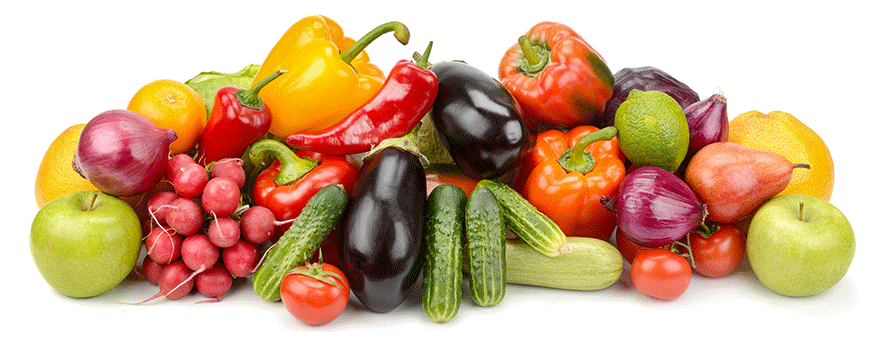
Double boost for organic sales this autumn
While retailers were building on the success of Organic September, research from Paris University* hit the front pages on October 23 apparently showing that people who eat organic food are 25% less likely to get cancer.
The Soil Association reported massive coverage for Organic September which contributed to increased demand for organic produce while grocery sales overall were slowing.
“The consensus across all retail reporting is that food and drink sales have slowed over the past three months but organic has continued to show an overall upward trend,” said SA’s Clem Teagle. “Organic in all of the key focus categories of Organic September (dairy, produce, grocery) outperformed non-organic in September and there were also a number of very strong performances including alcohol, confectionery and eggs.”
Read the full story here...
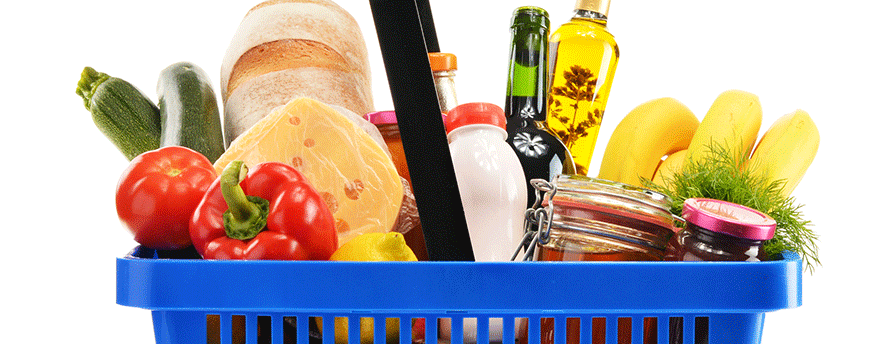
Grocery sector should expect a holiday season second wind
A slightly bigger lull than expected in grocery spending hints at shoppers saving their pennies for the Christmas season, according to Nielsen. Following a record summer of spending, the data analytics company’s figures reveal that shoppers are tightening their purse strings in anticipation for the upcoming holiday season.
Value sales growth slowed to +1.9% during the four-week period ending 6 October, compared to +2.4% sales growth in the previous month. Volume sales at the major supermarkets also fell to -0.6%, down from 0%.
Mike Watkins, Nielsen’s UK head of retailer insight, says: “The beginning of autumn signalled an objectively disappointing, though not entirely unexpected, slowdown in sales. But keeping in mind retailers had such a strong summer period, it’s likely shoppers are pressing the reset button after a season of excess.”
Read the full story here...

Artisan food retailers are missing out on double-digit sales growth
A new report into the UK’s artisan food and drink industry reveals that more than half (53%) of independent retailers and caterers don’t currently sell online, and 35% of those claim they have no intention of making a shift to digital trade.
The 2018 Speciality Market Report, which was commissioned by and launched at Speciality & Fine Food Fair in September, shows that retailers could be missing out on double-digit sales growth from the burgeoning UK e-commerce market.
Three-quarters of those who have embraced an online platform say it has boosted sales and attracted new customers, with 15% of those claiming sales have increased by more than 40% in the past 18 months, and more than half reporting sales rises of up to 9%.
Read the full story here...

Why health food retailers can succeed while the High Street suffers
Face-to-face advice from independent health store staff is the foremost factor in keeping high street stores in rude health while the number of casualties in other sectors continues to rise.
Reports two years ago that 46% of Britons say they take vitamins and minerals on a daily basis (Mintel) show that this is a strong segment which is destined to continue its upwards trajectory, according to the boss of a data marketing company.
The global dietary supplements market size was valued at $133.1 billion in 2016 and is projected to accelerate at a compound annual growth rate (CAGR) of 9.6% from 2016 to 2024, says Andy Wood, chairman of Go Inspire Insight. And almost 30% of all organic sales now take place online or on the high street, with the remaining share in supermarkets.
Read the full story here...

Mintel identifies teens as the new cosmetics consumers
Mintel’s team of global beauty and personal care analysts has developed an acronym to identify a new generation of beauty consumers. Aged 16-20 (born between 1998 and 2002), they are Approaching adulthood, Video driven, Influencer aware and Digital natives, or ‘AVIDs’.
- Approaching adulthood: This group is gaining independence, whether by entering the workforce or choosing higher education. They now have money and responsibility to make their own decisions.
- Video driven: Their beauty education is ongoing and never ending. They grew up with video tutorials on every kind of beauty look, which has encouraged them to be more creative and experimental.
- Influencer aware: While previous generations grew up with magazines and celebrities for beauty inspiration, along with social media, these pop culture elements are now combined with influencers – aspirational but accessible figures that connect with consumers on a variety of platforms.
- Digital natives: They are naturally ‘internet smart’ – cautious over data sharing, aware of hacks and concerned about how brands are tracking them. This affects what they share online: mistakenly associated with the ‘selfie generation’, they are actually less likely than their Millennial counterparts to post pictures online.
Charlotte Libby, Global Beauty Analyst at Mintel, says: “Technology has a strong impact on AVIDs’ lifestyles. Besides traditional teenage-related struggles, this generation is facing a new set of negatives that the beauty industry would do well to address.
Read the full story here...

Sports nutrition: it's your business
Sales of sports nutrition products through the major supermarkets and independents are set to capitalise on the high protein trend in mainstream foods.
That’s the conclusion in a Mintel report on attitudes to sports nutrition (June 2018) which concludes: “While the growing choice of high-protein food and drink is creating intensified competition, convenient formats and increasing availability in the mainstream are helping to make sports nutrition more accessible. Interest in products supporting gut health and those featuring health-boosting herbs and spices highlights these as areas ripe for innovation.”
While online and specialist retailers dominate this market, new product development focused on convenient formats and indulgent flavours is helping to make sports nutrition accessible to mainstream consumers. However, this remains “a decidedly modest channel in the market”, says the report.
Read the full story here...

What customers expect from their favourite retailers
Retailers need to change the way they communicate with customers online or risk alienating them. That’s the conclusion of research conducted by Censuswide for AI-powered customer marketing platform, Ometria.
Three-quarters of people feel most retailers don't understand their interests; the few retailers that are getting this right are setting a high bar for others to follow. Specifically, the report reveals:
Read the full story here...
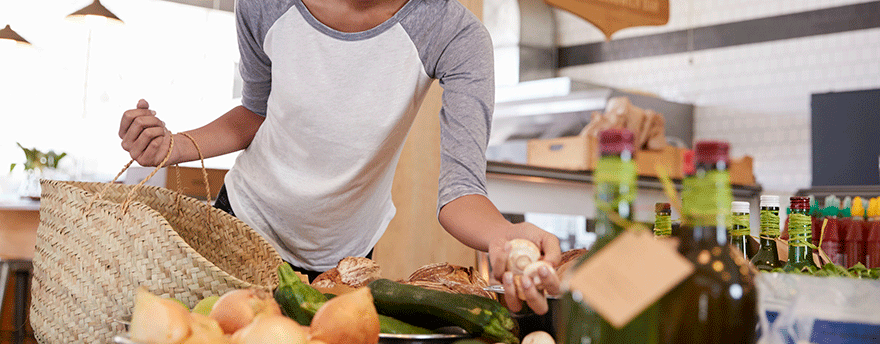
Voracious organic appetite among behemoths
Organic food retailing in the UK could be in line for a shake-up if trends seen elsewhere in Europe continue, an industry commentator has warned.
With thousands of organic food shops, the European retail sector is ripe for consolidation, says Amarjit Sahota, President and Founder of Ecovia Intelligence (formerly Organic Monitor).
“There are many chains of organic and health food shops in Europe, however few have developed a significant presence outside their home markets,” he says. “As the European organic food industry starts to mature, expect to see more such consolidation. The question is whether the retail sector will be controlled by large groups like Carrefour and Amazon or dedicated organic/green enterprises.”
Read the full story here...

Overwhelmed, confused and unprepared – menopause survey shows women need your help
The vast majority of women are going into menopause feeling unprepared and fearful of how it will impact their lives, both at home and at work, new research has revealed.
The survey of 1,100 women throughout the UK, conducted by menopause expert Maryon Stewart, has highlighted that 96% felt unprepared for their menopause, while 29% feel overwhelmed or confused and 27% have chosen to journey through menopause naturally but are lacking knowledge.
The research also highlighted that 71% of women are relying on information they get from the internet, while only 12% choose to speak to their doctor and as few as 2% elect to discuss their menopause with a practice nurse as they don’t believe they will receive constructive help.
Read the full story here...
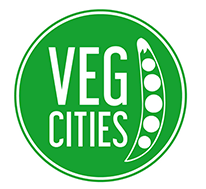
Veg Cities are cooking
Veg Cities launched in June following pilots in Cardiff, Birmingham and Brighton & Hove. The Sustainable Food Cities campaign is led by food and farming charity Sustain in partnership with the wider Peas Please initiative of the Food Foundation, Nourish Scotland, Food Cardiff and WWF.
The aim of Veg Cities is to increase the availability and consumption of vegetables. Food partnerships and/or local authorities are working with seven different sectors, from retail and local markets to schools and local authorities. The aim is to encourage cities to take action such as:
Read the full story here...

The ‘unstoppable’ market for women’s probiotics
A global report on probiotics for women by Lumina Intelligence lists the UK as one of the world’s most dynamic markets for the product. And it states that Brexit may see the UK shake off the shackles of EU legislation and take a more liberal approach to food health claims.
The report, ‘Women, probiotic supplements and digital immersion’, says the trend for women’s probiotics is “unstoppable” as scientific data builds and is reflected by an ever-increasing number of government-approved health claims in most global markets.
Read the full story here...
Is kombucha the new coconut water?
News that Coca-Cola has bought Australian organic kombucha business Organic & Raw Trading Co indicates the rise of the naturally-fermented live culture beverage.
At the same time, a report by Lumina Intelligence on the global kombucha market quotes Statistica figures that show the global market was worth US$1.06 billion in 2016 and is expected to reach just under $2 billion by 2020.
Does this make kombucha the new coconut water? asks Lumina.
Data captured by Lumina Intelligence in 2018 on the kombucha market included 151 brand variants and 76 brand owners across 18 countries. The UK has 11 brand variants, one more than the US which has 10, according to Lumina.
Read the full story here...

Technology trend predictions for 2019
The constantly changing face of retail presents a wealth of opportunities and challenges for retailers. E-commerce sales figures continue to grow, and new technologies are shaking up shopping habits. But how can brands keep up? Katie Woodhead, Head of Business Consulting at ATTRAQT, provides some pointers:
By looking in detail at emerging trends, retailers can adapt to the fast-changing shopping market with agility – transforming risks into potential and turning opportunities into conversions and sales. To help in this process, we’ve selected our top three trends that will be shaping the shopping space over the course of 2019. Great preparation is, after all, the key to future success.
Read the full story here...

Black Friday, Cyber Monday, Christmas and Cyber Week: How consumers make shopping decisions
Love it or loathe it, and whether you consider it relevant to the natural health sector or not, Black Friday and its ilk shattered sales records last year.
Criteo, which works with a growing network of over 18,000 brands and retailers across the globe, says it’s imperative to think about how to better connect with shoppers as they move across devices and channels.
In 2017, mobile transactions were lowest (33%) on Cyber Monday (a work day), and desktop usage climbed, according to Criteo’s monitoring systems. This probably represents the work crowd getting to the office and searching for online deals.
Read the full story here...

Why retailers need to be tech-savvy
New research has revealed the impact innovative technology will have on where British consumers shop.
The research among 2,000 British consumers, published by Hitachi Consulting, exposes the attitudes to technology of different generations and incomes – identifying millennials as the group retailers can target to boost sales and grow market share.
Over two-thirds (69%) of respondents aged 24-35 claimed they would be more likely to shop with a retailer that was enhancing the shopping experience with innovative technology. This generation has also proved over the last 10 years that it is the most likely to change its shopping habits, with almost three-quarters (72%) stating their routine differs to a decade ago.
Read the full story here...

Olive oil sales squeezed
Poor harvest conditions continue to provide a challenging backdrop to the olive oil market, according to the latest analysis of value and volume sales across Europe, including the UK.
Data analysts IRI says Europe is showing an average sales volume decline of -4.3% with Spain and Germany showing the biggest drop.
An increase in value sales of 6% year-on-year is explained by higher material costs and price inflation across the region.
Read the full story here...

Consumers warm to healthy snacks
Health is currently driving innovation in the snacking category with 40% of UK shoppers happy to pay a premium for healthy or functional snacks, according to Nielsen.
The analyst’s report ‘Welcome to the Snacking Revolution’ says 41% of UK consumers seek out snacks with less sugar, 39% look for low fat, 41% want snacks for energy and refuelling, 43% are careful about the portion size and 40% expect to pay a health premium.
“The snacking category is currently worth over £18 billion, and growing at 0.3% in value. It’s an enormous category and an integral part of the store that drives basket spend,” says Joanna Parman of Nielsen FMCG and Retail.
Sugar tax hasn't changed habit of a lifetime
The UK sugar tax has had minimal impact on consumer behaviour since its implementation in April this year, according to Nielsen which says 62% of UK shoppers claim to have not changed their consumption behaviour in any way. Only one-fifth are checking sugar content on packages more frequently since the tax came into effect.
Prior to the tax being rolled out, the majority of the UK supported the government-imposed levy, and some even felt it wasn’t strict enough – 54% of respondents supported the tax, and since its implementation, 69% said it should be expanded to confectionery and biscuits.

Whatever next?
Highlighted by foodnavigator.com recently were several innovations that could give adventurous health stores even more of a quirky edge. Hand crafted Sea Chips salmon skin crisps, currently in Whole Foods and Harrods, caught the eye – the skin is often discarded yet is packed with nutrients. And Tyrell’s has come up with pink crisps combining the good old spud with raspberry and prosecco. Cheers.
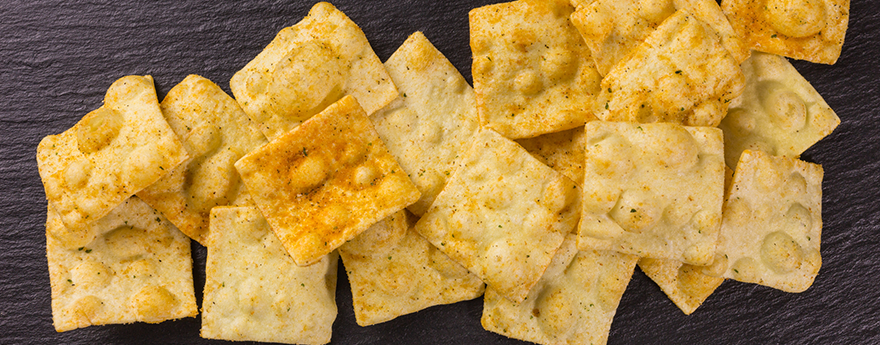
Innovation is driving healthier crisps and snacks – Mintel report
The buzz around the health credentials of pulses looks to have made its mark on consumers, with half of savoury snack eaters deeming snacks made with pulses healthier than potato-based ones. This gives scope for manufacturers to explore healthier formulations of snacks, according to Mintel in its report ‘Crisps, Savoury Snacks and Nuts’.
Savoury snacks high in protein would appeal to 28% of UK consumers, says the report. High-protein claims have traditionally been seen in meat snacks, but have in recent years seen wider adoption by roasted beans and peas as well as nuts and seeds. Given the high interest, this is an area with scope for more NPD by suppliers.
Read the full story here...
Consumers want healthier ready meals, more plant-based options
Brits love the convenience of ready meals but more of us are demanding healthier alternatives to meat. That’s the finding of a survey by Eating Better, an alliance of UK organisations with health, environment and resources perspectives.
UK spending on ready meals topped £4.7bn in 2017, making the UK the biggest ready meal market in Europe. Nine out of 10 of us eat ready meals or ready-to-cook products (Mintel).
Read the full story here...
PARENTING: Reducing risk of childhood obesity by 75%
A study based on 40,000 individuals looked at the association between a mother’s lifestyle and the risk of obesity among their children aged between nine and 18.
The Harvard T.H. Chan School of Public Health, reported in the BMJ in July, found that mothers who maintain five healthy habits – eating a healthy diet, exercising regularly, keeping a healthy body weight, drinking alcohol in moderation and not smoking – may reduce their children’s risk of becoming obese by 75%.
Read the full story here...
PARENTING: Desperate parents need better snacks for toddlers
Stand-up comedian and writer Sam Avery is partnering with baby and toddler food brand Organix to find out what’s hiding in some baby finger foods and toddler snacks. As a parent he’s standing up for his children and saying no to junk.
Research by Opinium for Organix, conducted among 1,000 UK parents of children aged 0-3 years, revealed that 76% were shocked to discover that some baby and toddler snacks contain up to 30 separate ingredients.
Read the full story here...

PARENTING: School holidays means 5x more sugar!
British parents will let their children consume up to FIVE TIMES as much sugar during the summer holidays as they would any other time, according to research. A worrying poll of 1,000 parents with children aged two to 17 found sugar intake will be hugely boosted during the break from school.
Unsurprisingly, ice creams and sugary drinks were named as the biggest culprits, with just one in 10 parents reporting their child eats more vegetable sticks over summer. A quarter of parents say their child eats far more sweets over the summer holidays than they ordinarily would.
Read the full story here...
Emerging cosmetics industry trends – comment by NATRUE
Changing trends in the cosmetic industry impact the natural and organic cosmetic sector. These include areas such as clean beauty, conscious and ethical consumerism including vegan formulations, sustainability of raw materials and their sourcing and packaging.
Exclusively for Better Retailing Magazine, Cecile Zumbiehl of certification marque NATRUE, observes:
“An aspect that links these trends is a crucial change in consumer behaviour: they are always looking for new ‘green’ alternatives. The principle product categories for natural and organic cosmetics continue to be leave-on products such as face and body creams, lip balms, colour cosmetics such as lipsticks, and rinse-off products like shampoos and shower gels. In terms of claims driving new trends, anti-pollution has recently become one to look out for.

Beauty and wellbeing findings by the Soil Association
Increased awareness of global issues through online media and exposés has resulted in consumer mistrust. Consumers are putting pressure on many different industries to conduct business responsibly. These are key findings in the Soil Association 2018 Beauty & Wellbeing report.
Accessibility of information, such as Netflix documentaries on health and global issues, has led to heightened awareness of these issues which is changing attitudes.
Initiatives such as the Sustainable Cotton Communique pledge by 35 brands to achieve sustainable cotton by 2025, are on the rise as consumers demand better business practise. Brand transparency continues to perform with prominence in labelling and supply chains.
Read the full story here...
How to spot the sleep-deprived
Talking to imaginary pets, crying because the supermarket sold out of yoghurt and getting in the shower fully clothed are among some of the strangest things people have done when sleep deprived, according to a new poll carried out by BetterYou.
The survey of 358 people from across the UK found that poor quality of sleep was a common problem with over half (53%) claiming they struggled to nod off.
The search for a good night’s sleep is perhaps contributing to the amount of people self-medicating with nearly one in five admitting to turning to sleeping pills or alcohol.
Read the full story here...
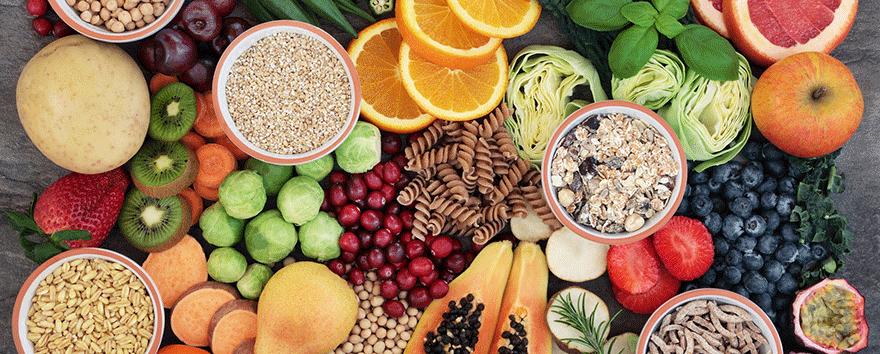
New figures on fibre intake and bowel function for women
Harvard Medical School recently reported that women who include plenty of fibre in their diet are a fifth less likely to develop bowel control problems as they age. Women eating more fibre were 18% less likely to have faecal incontinence (inability to control bowel movements) and a third (31%) less likely to have diarrhoea.
The research team investigated the effects of long-term fibre intake among 58,000 women taking part in the renowned Nurses’ Health Study. Those taking part were divided into five groups based on their daily fibre intakes. Those with the highest fibre intakes – 25g daily – had a faecal incontinence risk that was 18% lower than those with the lowest fibre intakes.
Fibre intakes in the UK are concerningly low. Latest data shows that women aged 19 to 64 years are getting just 17.4g daily. This is sufficiently lower than dietary guidelines which recently increased to 30g daily, indicating a large fibre gap.
Read the full story here...
Consumers still struggling with ‘Clean’ label
Stephanie Mattucci, a global food science analyst at Mintel, has grappled with consumer attitudes to the burgeoning trend of ‘clean label’. Clean-related terms such as ‘clean eating’ or ‘clean label’ do not have formal definitions, she says.
It’s generally accepted that clean eating refers to eating whole, natural, unprocessed foods, and avoiding artificial ingredients and highly processed foods. Or in some cases, following diets such as vegan, dairy-free or gluten-free. This aligns with what consumers already consider healthy: natural, freshly made, organic, and preservative-free.
The concept of clean label has been used by the food industry for many years, but clean-related terms have now emerged as part of consumers’ vocabulary as a new way to say ‘healthy’, especially in the US.
Read the full story here...
Kantar sees the fresh produce trend
A Kantar Worldpanel report says that, despite global FMCG growth remaining slow in 2017, retailers and manufacturers that adapt to meet macro-economic changes and shopper needs can still find ways to grow.
“Around the globe, consumers are becoming more health conscious,” says the report called ‘Winning Omnichannel: Finding Growth in Reinvented Retail’.
With people living longer and having more information at their fingertips, there has been heightened demand for FMCG products that promote healthy living or deliver added health benefits.
Read the full story here...
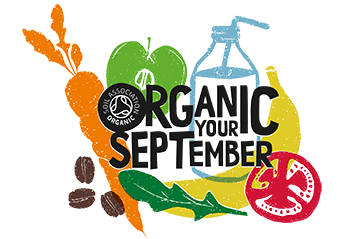
Plan now for Organic September
Organic September encourages people to eat, drink, use and choose organic every September. 2018 is set to be the biggest yet, de-mystifying organic and showing consumers how easy organic food is to introduce to their daily lives.
The main thing to note is that it is completely FREE to join in and all businesses taking part will be given a “toolkit” of materials, both print and digital, to help support their Organic September activity, whether or not they are certified by the Soil Association.
For independents, there’s a free visual merchandising guide to help get the organic message across in the run-up, including a new point-of-sale toolkit, available in June, to help highlight organic products with clear messages for shoppers.
Read the full story here...
Celebrate the success of Wake Up To Organic 2018!
Over 280 independent stores, cafes and farm shops across the country served up over 14,000 free organic mini breakfasts on Wednesday 13 June in the biggest ever annual event to help shoppers make the switch to organic at the start of the day.
With more stores taking part than ever before and every region of the UK covered, the UK woke up to celebrate organic with their local independents who served up lots of tasty treats, showcased local producers and shared what makes them happy about growing, making and selling organic food and drink.
The campaign was supported by a host of organic brands providing samples for stores to use on the day to create lots of tasty treats and many Organic Trade Board members running their own Wake Up events in the office or getting out and about to visit stores and get involved in the action.
Read the full story here...
Anticipated growth in organic personal care
The global organic personal care market size is expected to reach $25.1 billion by 2025, exhibiting a 9.5% compound annual growth rate during the forecast period (Grand View Research Inc).
Growing demand for organic and natural hair care, skincare, and cosmetic products is expected to expand market growth over the projected period, including a rise in demand for vegan products.
Demand for environmentally sustainable products and celebrity promotion of veganism will drive this trend, coupled with changing consumer perception toward organic products and animal welfare. Not to mention demand for chemical-free skin and hair care products.
The researchers also note that enhanced skin tone is another contributing factor as organic beauty products are made to provide skin with a better treatment, by using natural-based ingredients and fragrances that do not cause any harm to skin and body.

How bad is the British diet?
New research by PharmacyOutlet.co.uk has examined how often Britons indulge in poor eating habits. The online pharmacist commissioned an independent survey among more than 2,000 UK adults and discovered:
- 38% of people eat a ready meal at least once a week. Men (45%) were far more likely than women (33%) to do this.
- 27% eat fast food on a weekly basis. The figure jumps to 46% among millennials (18-34 year olds).
Read the full story here...
Sports nutrition protein bars lead growth
Sports protein products accounted for 72% of total UK sports nutrition value sales in 2017, with powder being the dominant format (source: Euromonitor). Hectic consumer lifestyles are generating demand for convenient on-the-go formats within sports nutrition, including bars and ready-to-drink products.
These categories were the fastest-growing in the UK sports nutrition market in 2017, with sales rising by 16% and 14%, respectively, in current value terms.
Collagen conundrum
Animal-sourced collagen in so-called beauty food is bucking the current growth trend of plant-based alternatives, says analytics company GlobalData.
The company’s 2017 consumer survey revealed that 57% of consumers worldwide said that collagen is effective in beauty/grooming products, while 45% preferred food as a format for beauty/grooming.
Is worker health the answer to the ‘productivity puzzle’?
While GDP has recovered since the 2008/9 Recession, productivity has more or less flat-lined. This is one of the highlights in a report from the Office for National Statistics (ONS) asking if the economy has recovered 10 years on.
Having shrunk by more than 6% between the first quarter of 2008 and the second quarter of 2009, the UK economy took five years to get back to the size it was before the crisis. The latest data show that the UK economy is now 11% bigger than it was before the Recession, says the report.
A shrinking economy meant many lost their jobs and employers stopped hiring. By the end of 2011, the quarterly unemployment rate reached 8.4%, the highest since 1995.
Read the full story here...
Healthier products are consumers’ priority
European consumers want healthy, nutritious food and they are willing to pay more for it. That’s the headline finding of a trends report by ingredients company Ingredion.
But the same consumers are unhappy with the standard of healthy food and drink available, and are challenging the industry to formulate and manufacture better quality, more nutritious products that also deliver taste and freshness.
The food and drinks industry still needs to earn consumer trust. Not only do they want more information on what their food and drinks contain, but consumers are using technology to closely scrutinise products prior to making buying decisions.
Read the full story here...
Shoppers question what’s natural
Shoppers are becoming suspicious of seeing the word ‘natural’ on product labels, according to a report by Dutch food colouring specialist GNT. The manufacturer says 45% of consumers are suspicious when they see claims of naturalness on product labels.
A research company commissioned by GNT asked more than 5,000 consumers about natural claims on labels and discovered that consumers pay closer attention than ever to what they eat and drink every day. Checking for unwanted ingredients has become routine.
Read the full story here...

Food flavours for balance and harmony
Market intelligence agency Mintel has identified major flavour trends that will influence the products on health store shelves.
Middle Eastern cuisine has become an inspiration for fusion flavours, while ‘less sweet’ desserts featuring ingredients such as olive oil and vinegar are gaining popularity in the US, and functional ingredients are adding colour and flavour to food and drinks in western markets.
Meanwhile, Mintel predicts spice blends, sauces and condiments will introduce diners to emerging international cuisines, while new spin on seasonings and preparation methods will bring meaty flavours to both meat and vegetables alike.
Read the full story here...
Delay in coeliac disease diagnosis risks neurological damage
Coeliac UK, the largest independent charity for people who need to live gluten-free, says that delayed diagnosis of coeliac disease is creating a growing health problem across the UK with undiagnosed patients at risk of suffering with complications of the disease including irreversible neurological damage.
In its 50th anniversary year, the charity is urging health professionals and the general public to take coeliac disease seriously. During its Awareness Week activities (14 - 20 May 2018) Coeliac UK was highlighting the symptoms and emerging evidence relating to previously unknown complications of the autoimmune disease.
Chief executive Sarah Sleet says that even though awareness of coeliac disease has grown, there still exists a perception that the disease is not that serious because it requires a gluten-free diet as its medical treatment.
Read the full story here...

Serious about plastics waste
A group of 60 manufacturers, retailers and trade associations aims to withdraw single-use plastic packaging by 2025 through better design, and make 100% of plastic packaging reusable, recyclable or compostable.
But a firm that specialises in making pallets from recycled plastic warns that consumers need to be assured that their recycling is beneficial.
If plastic is recycled as single-use packaging it merely runs a second risk of going to landfill or into the oceans, whereas re-use as a long-term product negates this risk.
Read the full story here...
Digestive health tops the nutraceutical agenda
The importance of a healthy gut has risen to the top of the nutraceutical industry’s agenda for the first time, a new survey shows.
Speaking ahead of Vitafoods Europe (May 15-17, Palexpo, Geneva), experts have attributed the findings to growing consumer awareness of the importance of healthy gut microbiota and the potential of probiotics.
The organisers of Vitafoods asked 220 nutraceutical industry professionals to choose the three most important health benefit areas for their companies. Nearly a quarter (23%) named digestive health, with the same number identifying general wellbeing and healthy ageing. Another 22% named cardiovascular health, while 21% said immunity was a key area.
Read the full story here...
Food companies ‘need to create a protein buzz’
Insects are a healthy and highly nutritious food source with high protein, fibre, vitamin and mineral content, but too few consumers are aware of the benefits.
That’s the conclusion of Globaldata’s Consumer Associate Analyst Matthew Perry, who points out that cricket flour has twice as much protein as beef, and twice as much iron as spinach.
But 38% of consumers surveyed by Glabaldata are unaware of the ingredient. Perry says insects are also greener and more sustainable alternatives to traditional animal protein sources such as beef, pork and poultry given that they emit fewer greenhouse gasses and require less water and feed to produce.
Read the full story here...
What’s the true cost of crime?
Reported retail crime in the UK stands at £700m. It’s estimated that this costs 1.2% of turnover on average. Add to that 160,000 incidents of violence or abuse against staff and we’d all agree that something has to be done.
A company called Facewatch was at the National Association of Health Stores’ informative lunchtime event at Natural & Organic Products Europe in April to offer a solution.
The Met’s deputy assistant commissioner Mark Simmons has said that his officers won’t bother with looking into crime where the value of damage or item stolen is under £50. Will the police attend a shoplifting report? Probably not, said Nottinghamshire’s Police & Crime Commissioner, Paddy Tipping.
Facewatch chairman Simon Gordon explained his system of real time alerts using facial recognition technology which issues alerts either to a shop or a collective of co-operating high street businesses.
Whether the cost of such a programme is worth it depends on the problems your store is facing. facewatch.co.uk

Can health stores help with migraine?
Migraines affect a whopping 14% of the population – that’s 6m people and new research shows that you may have part of the solution on your shelves.
More than 190,000 migraine attacks every day in the UK are more common in women and are the leading cause of disability among all neurological disorders. Twenty-five million work and school days are lost every year. The financial burden on the UK economy is conservatively estimated at around £3.5bn.
And half of sufferers are unhappy with their current treatment.
A randomised, double-blind, placebo-controlled study using Bio-Kult probiotics in the intervention group has shown a dramatic reduction in the mean frequency of headaches – in chronic migraine by almost half with no change in the placebo group, and a similar result in episodic migraine.
Asthma study may reveal CBD hope
Recent publicity about the true dangers of asthma has highlighted the heavy burden of the common inflammatory disease in adults and children. The number of asthma cases doubled between 1990 and 2015.
According to Asthma UK, 5.4m people receive treatment for the condition, 1.1m of them children – and the UK has one of the highest rates in Europe.
Cannabis biotech company CIITECH was at Natural & Organic Products Europe in April to promote the collaborative work of Prof. Raphael Mechoulam, discoverer of the endocannabidinoid system, and Prof. Francesca Levi-Schaffer, a global expert in asthma research.
The Hebrew University scientists are working towards identifying a possible inhibitory effect of a derivative of cannabidiol (CBD) on allergic airway inflammation. This is expected to reveal significant advances especially for those who are steroid-resistant.

Keep it simple, say Millennials
Health and wellness Millennials are young adults aged between 18 and 35 who aspire to living a healthy life. But they struggle to achieve this because they face so many daily pressures in an increasingly complex world.
According to a summary of consumer trends research by Nature’s Bounty, presented at Natural & Organic Products Europe 2018, these people are looking for a trusted, credible brand with simple solutions offering effective, easy-to-use products.
Read the full story here...

GDPR deadline looms – help for small stores
Many companies are behind schedule to achieve Global Data Protection Regulation (GDPR) compliance by the looming May 25 deadline. Around 40% of companies only expect to achieve compliance with the regulation after the deadline.
That’s the finding of a major survey sponsored by international law firm McDermott Will & Emery and carried out by the Ponemon Institute.
Read the full story here...
12% of Brits follow meat-free diet – The Grocer
Research carried out for The Grocer magazine indicates that 12% of the UK population follows a meat-free diet. Young people continue to drive the trend, according to the Harris Interactive research among 2,000 consumers.
The figures show that 7.8m people have given up meat, with 3.9m identifying as vegetarian, a three-fold rise since 2012. Interestingly, 25% of those surveyed said they were thinking of giving up meat in the next year.
Animal welfare concerns and the ethics of the meat industry were cited as key factors, as well as dietary considerations.
The full report is available here (subscription required).
The majority of US consumers prefer the term 'plant-based' to 'vegan', according to a US-wide survey by food development specialist Mattson. Many consumers see veganism as associated with animal rights and environmental activism, while they see 'plant-based' as a positive dietary option.

Visitors form a queue to meet Dr Rangan Chatterjee on the Viridian stand at Natural & Organic Products Europe.
How health stores and the NHS can work together
Viridian is spearheading a drive to link the work of UK health food stores with NHS services.
Following the recent Jack Noah Memorial Lecture at the Health Food Institute by Dr Rupy Aujla and the visit of TV personality Dr Rangan Chatterjee to Natural & Organic Products Europe, Viridian MD Cheryl Thallon is calling for a joint mission to promote “lifestyle medicine”.
“I envisage a training event where Drs Chatterjee and Aujla pool their expertise and create a set of approved protocols that health food stores can sign up to, giving all GPs the confidence to send their patients for a dose of lifestyle medicine for 90 days, prior to a further visit to the GP to reassess,” says Thallon.
She will reveal full details in an article in the Summer issue of Better Retailing Magazine.
Meanwhile, you can view her interview with Dr Chatterjee and Patrick Holford here.
It’s getting healthier, say analysts
More people are buying vegetarian, free-from and organic food as the healthy eating trend gathers pace.
That’s the view of big data and technology expert IRI which has surveyed European shoppers.
People are paying more attention to their health as the healthy eating trend gathers pace, according to IRI. More than two thirds (72%) of shoppers in the UK are buying healthy food – with less salt, sugar, fat or calories.
Read the full story here...
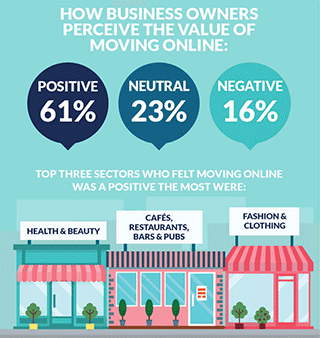
View from the High Street – how owners see their future
A poll of 300 high street independents reveals that almost half expect good times ahead. The survey by Liberis, which provides alternatives to business credit cards, has revealed 46% of SME owners with a physical location view their future on the high street as “booming”.
Health and beauty retailers were among the top three sectors that plan to add online shopping to their bricks and mortar stores, the other two being restaurants and fashion outlets.
Read the full story here...
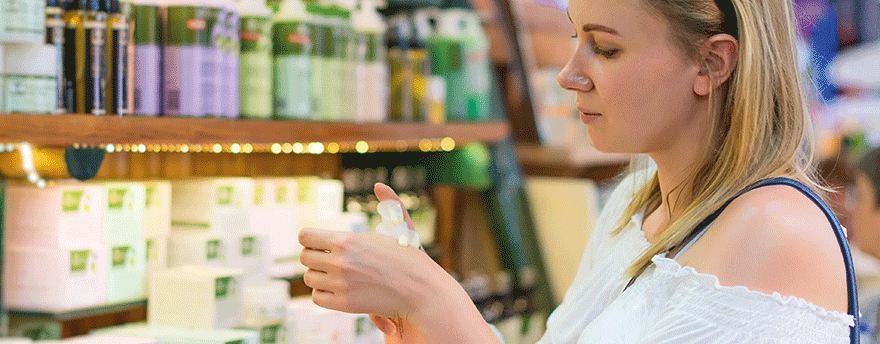
UK to see growing demand for natural and local beauty products
Sales of certified organic and natural beauty products in the UK reached £75.9m last year, according to the Soil Association Organic Market Report 2018. And a second report by a major analytics firm says 50% of beauty shoppers want the ingredients to be natural.
The Soil Association report reveals an increase of 24% and the seventh year of consecutive growth for the UK certified organic and natural cosmetics market.
And according to Mintel’s Beauty & Personal Care Trends Report 2018, half of UK consumers who buy beauty products are looking for natural ingredients.
Read the full story here...
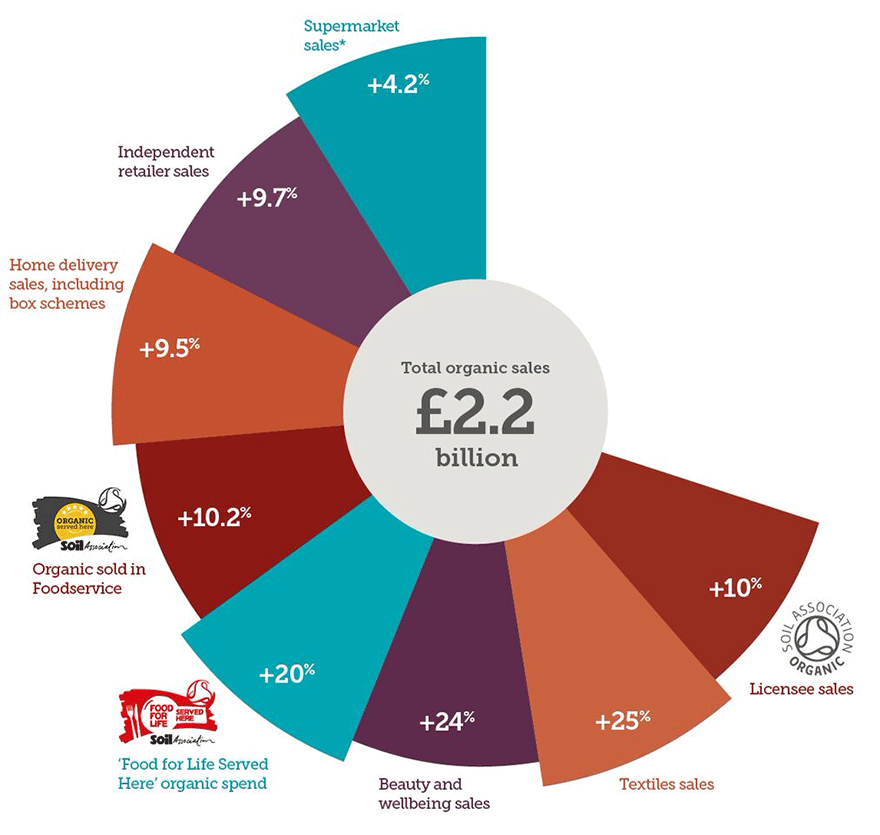
Independents shine in organic success
Encouraging figures emerge from the Soil Association 2018 Organic Market Report, which shows UK independent retailers leading the way in new sales. Year-on-year growth of +9.7% saw independent retailers organic sales reach £359.3m in 2017 compared with 2016. That’s 16.3% of the market compared with supermarkets at 67%.
Only food service businesses did better with +10.2% growth for last year, with home delivery on +9.5% and supermarkets +4.2%.
The biggest surge came in the chilled and deli sector with +21.3% followed by beers, wines and spirits at +8.2%. Frozen was up 6.7% and fresh produce 6.5%.
However, bakery declined -10.3% and babyfood and drink -2.3%.
Read the full story here...
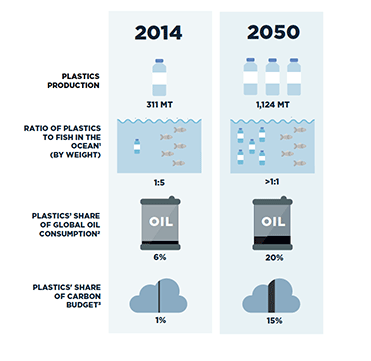
Plastic packaging – small steps in a big problem
Consumers awakening to the problem of plastic packaging, especially its effect on our oceans, is an issue brands are going to have to grapple with. The Ellen MacArthur Foundation estimates that by 2050 there will be more plastic in the sea than fish.
Shocking forecasts like that ought to inspire the packaging industry to go beyond token gestures – Mintel’s Packaging Trends Report 2018 applauds companies such as Ecover which uses plastic recycled from the sea, “but it won’t solve the problem”.
“Using plastic recovered from the sea to create new packaging has been used by ‘eco’ brands such as US-based method and Belgium-based Ecover to draw attention to the issue,” says the report.
Read the full story here...
Europe’s probiotic sales held back
Europe’s fixation with its anti-probiotic health claim stance has held back this obvious opportunity for UK health stores. While probiotic sales have rocketed in the USA by a staggering 138%, the European Nutrition and Health Claims Regulation (NHCR) has caused uncertainty with its refusal to allow health claims applications.
Statistics research company Euromonitor believes this has cost the European probiotics sector more than €1bn in sales between 2009 (when NHCR was introduced) and 2017.
Peter Nählstedt, Europe President of the International Probiotic Association, is quoted by William Reed’s nutraingredients.com as saying: “The overly stringent scientific requirements for probiotics and the de facto prohibition to use the term ‘probiotic’ resulting from the NHCR interpretation by the European Commission is depriving the EU of innovation and investment in research in a promising sector that is growing everywhere outside Europe.”
Meanwhile, global research continues to show the benefits of probiotics for everything from digestive health to mental wellbeing and weight loss.
Plant-based yoghurt will trend this year
Dairy-free yoghurt, especially beyond soy, is the next disruptor in the plant-based boom, according to The Yogurt Market and Yogurt Innovation, 3rd Edition by Packagedfacts.com (US market data).
“To an even greater degree than Greek yogurt in its pure, plain incarnation, dairy-free yogurt chips away at the premise that yogurt is at heart a good-for-you product category,” says the report.
“Non-dairy yogurt takes probiotics and high protein, both hot nutritional trends, and transfers these trump cards to the plant-based product trend’s bag of tricks.”
Just as in the UK, Packagedfacts notes that younger and trendier Americans are switching lanes from “leaning more vegetarian” to “leaning more veganish” and thereby cutting back on or foregoing dairy.
Use of the term “yoghurt alternatives”, now becoming mainstream, will complicate any dairy industry efforts to ban the use of “yoghurt” for dairy-free products in the way it has tried to enforce regulatory restrictions against the use of “milk” for plant-based milk alternatives such as almond, coconut or cashew.
More on the Packaged Facts report on yoghurt.

One in 12 parents are raising their children vegan
Eight percent of UK parents are bringing up their children as vegans, new research shows. Half of these parents confessed that their children had expressed a desire to eat meat or animal products before, with the majority stating that ‘health benefits’ associated with the vegan diet was the driving force behind their decision.
The team behind VoucherCodesPro.co.uk carried out the study for Veganuary following an increase in the number of searches on-site for discounts relating to vegan and vegetarian products.
According to the study of 2,177 parents of children aged 0-12 in the UK, 13% of parents have vegetarian children with the majority of these being raised vegetarian, rather than eating a meat-free diet through personal choice.
Read the full story here...
Stress factors – it’s a youth problem
A whopping 85% of Brits suffer from anxiety or stress at least sometimes, with three in 10 (29%) suffering at least three times a week and 15% every day. But it is the young who are experiencing the highest levels of anxiety and stress – 25% of 16-24-year-olds feel anxious or stressed every day.
Meanwhile, it seems that age brings an element of calmness, as just 9% of over-55s say they feel anxious and stressed on a daily basis and a quarter (25%) experience no stress whatsoever.
These are the findings in Mintel’s stress report with Richard Caines, the company’s Senior Food & Drink Analyst, noting: “High incidence of anxiety and stress and not finding enough time to relax suggest untapped space for brands to promote ways of relaxing. These can include products such as mindfulness apps, teas, bath and shower products, as well as adult colouring books.”
Some of these apply to independent health food retailing though colouring books might remain peripheral.
The report adds: “Just over half (51%) of the population describe their general health as somewhat or very healthy for a person of their age, while just 15% of Brits believe that they are somewhat or very unhealthy for their age. Getting enough sleep (69%), eating a healthy diet (68%) and regularly exercising (65%) are ranked as the top three habits for staying healthy.”
Mintel's Managing Healthy Lifestyles UK 2017 report is available to purchase priced £2195.
Genetic testing to help women lose weight?
Almost 60% of UK women who have tried to diet say they are yet to find a successful way to manage their weight, despite over a third admitting to having tried four or more different diets. Research by LloydsPharmacy discovered that over a third say it doesn’t matter what they do they can’t lose weight, while one in three say that diets may work initially but they put the weight back on.
And one in seven say that every diet they have ever tried has failed.
The research revealed that diet failures are leaving a quarter of British women feeling like they have no control over their weight, while a further 20% say they are at the end of their tether.
LloydsPharmacy Pharmacist Anshu Bhimbat commented: “In their attempts to lose weight many are often following fad diets and 59% have admitted to giving up a particular food group without consulting a dietitian.
“It can often be hard to know what approach is best as it can vary so much between individuals. Decoding our genes aims to demystify that by helping people understand how their genetics impacts their weight, therefore allowing them to make choices based on their individual body type.”
Genetic testing for weight management is a relatively new concept which until now hasn’t been as widely available or as affordable. LloydsPharmacy’s ‘myDNA’ uses a simple cheek swab to analyses genes known to influence body size and weight, our ability to maintain and lose weight, the way the body stores and processes dietary fats and the risk of elevated triglycerides and cholesterol levels. This helps to tailor a personalised diet plan.
See LloydsPharmacy.com for more.
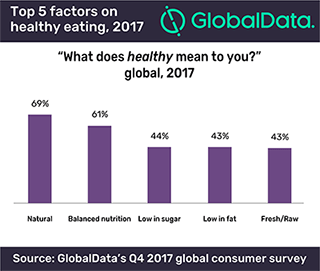
Healthy means natural says GlobalData
Today’s wellness revolution is developing rapidly and positioning products as ‘healthy’ is no longer enough for discerning customers. In order to effectively resonate with consumers through health claims, firmly identifying what this term actually means to them will be essential, according to data and analytics company GlobalData.
According to GlobalData’s primary consumer research, when asked what consumers believed healthy to mean, the factor which most resonated with consumers globally was ‘natural’, highlighting the popularity of unprocessed whole ingredients as a route to better health and the continued impact this claim has among a global audience.
Jamie Mills, Consumer Analyst at GlobalData, comments: “This is further strengthened by ‘fresh/raw’ which also ranked within the top five claims resonating with consumers. Positive claims such as these fit in with consumer desire to achieve optimum health through their lifestyle and are particularly evident as balanced nutrition was ranked the second most ‘healthful’ claim.”
Read the full story here...
Some old wives’ tales and (possibly) some smart remedies
Is turmeric a cure for baldness?
Does sleeping in socks filled with onions shake off a cold?
Well there have been some bizarre health remedies down the years but we are grateful to an online pharmacy website for clearing up a few old wives’ tales.
PharmacyOutlet.co.uk surveyed more than 2,000 UK adults to reveal the common, obscure and downright strange health remedies people put their faith in:
- 56% of UK adults – 29 million people – have gargled salty water to get rid of a sore throat, and 68% of those believe it works (it might!).
- The other most common health tricks people rely on are: sweating out a cold (47%); having a nightcap to help them sleep (44%); and “hair of the dog” (36%).
- A third of people (32% or 16.6 million) admit to eating carrots to improve their eyesight, but just 25% of those actually think it helps.
- Some of the more bizarre health remedies people try include: applying butter to burnt skin (19%); sleeping in socks filled with onions to shake off a cold (8%); and rubbing turmeric on their scalp to combat baldness (7% of men).
See the research results and the pharmacy’s opinions in this table and send your opinions – and your obscure remedy ideas – on Facebook or .
